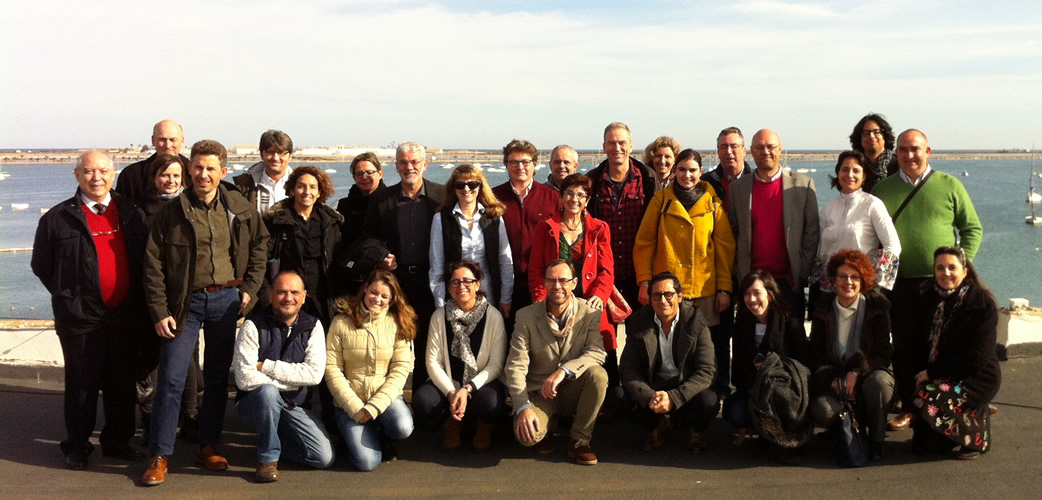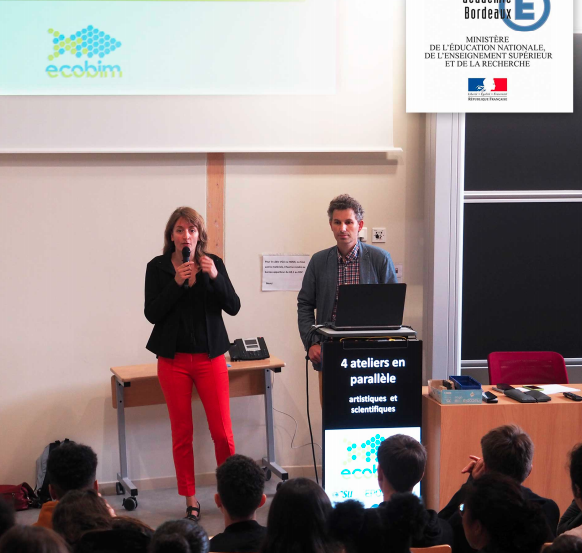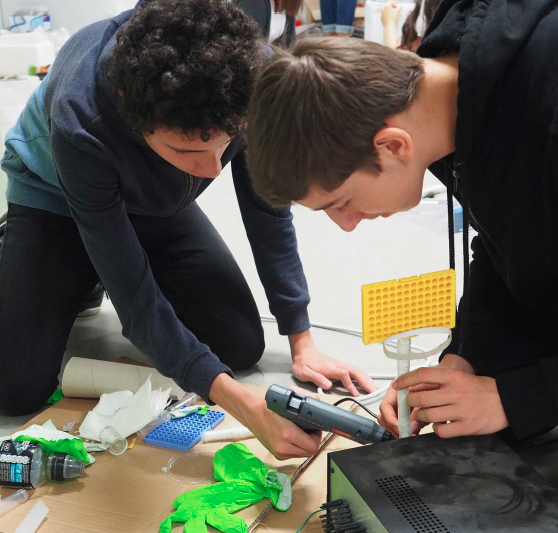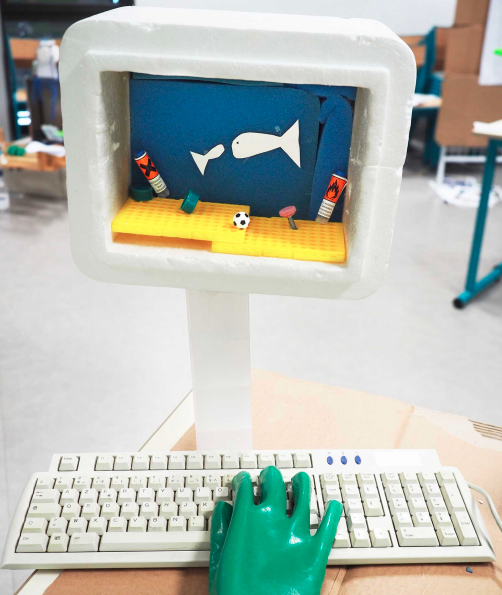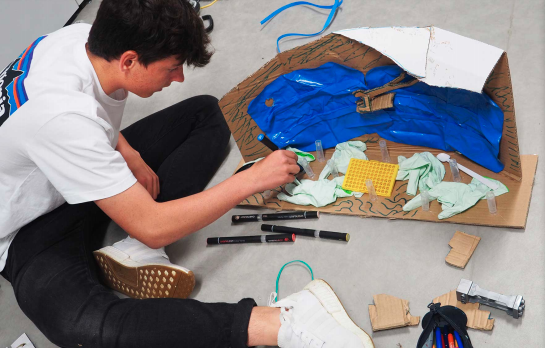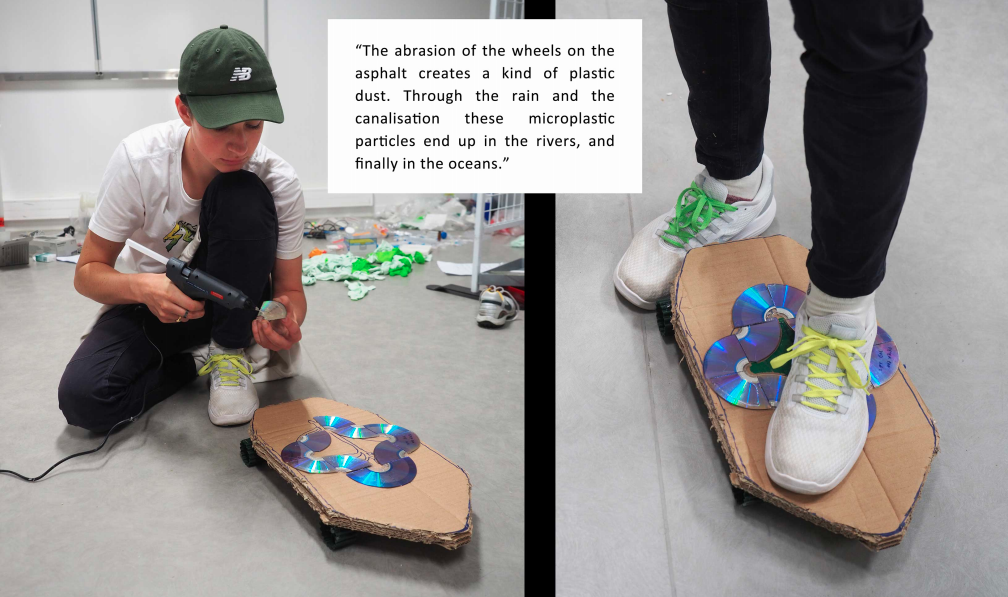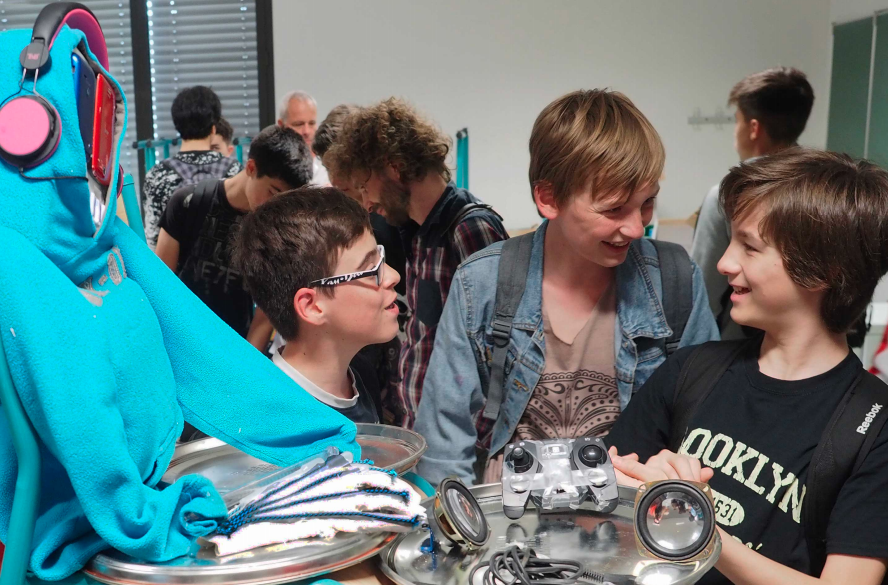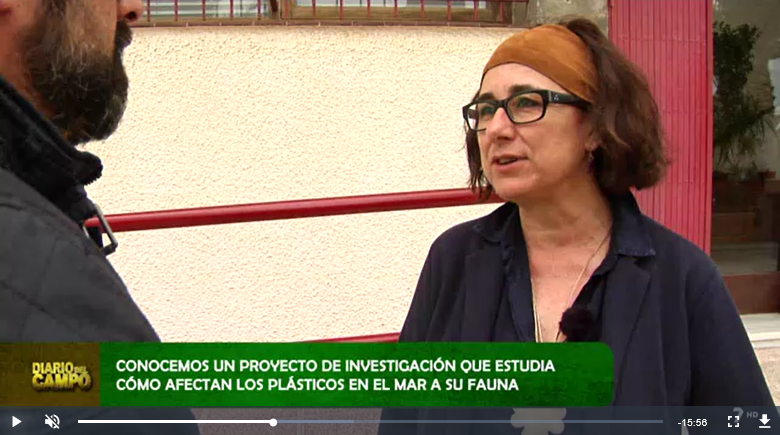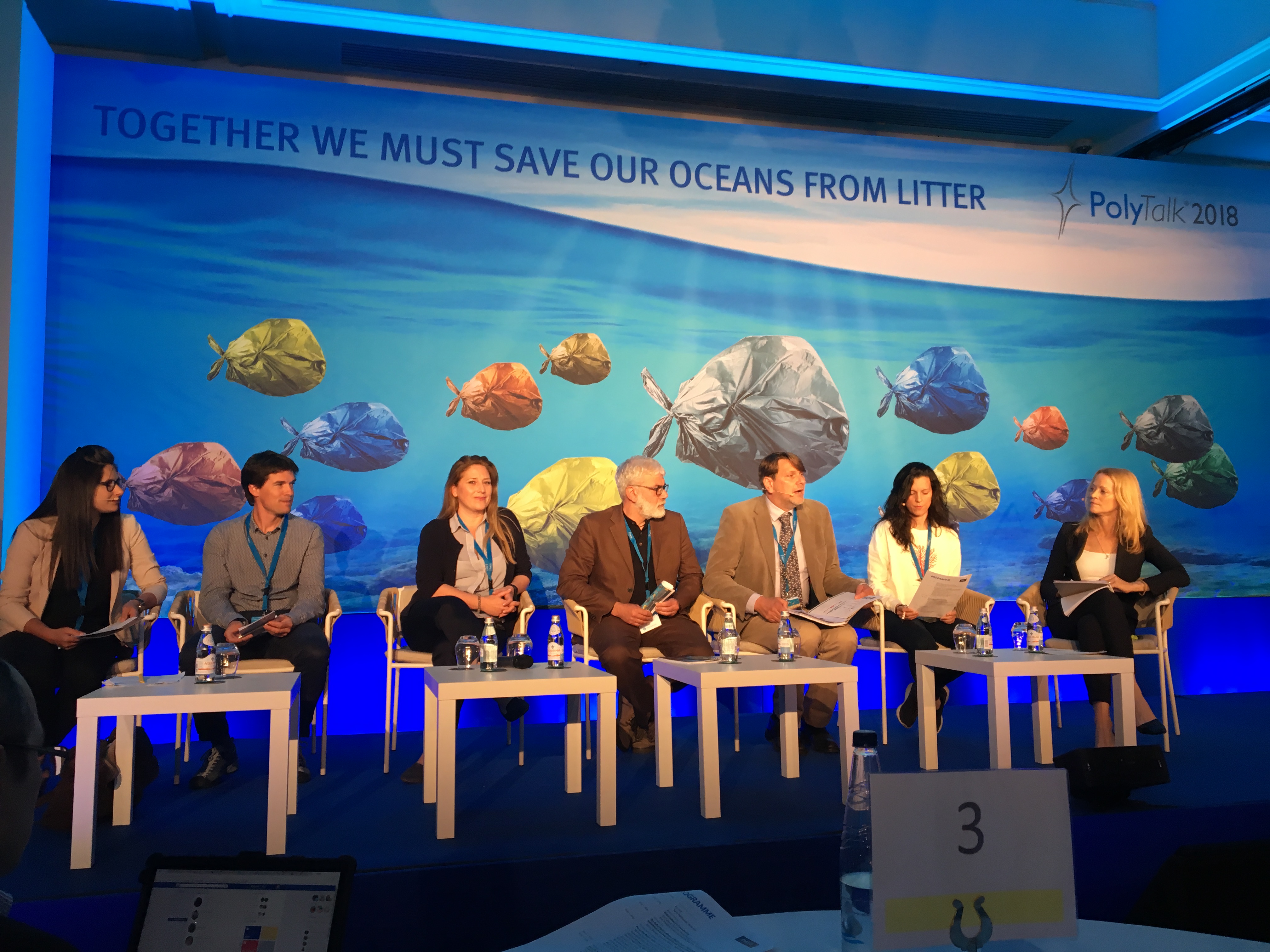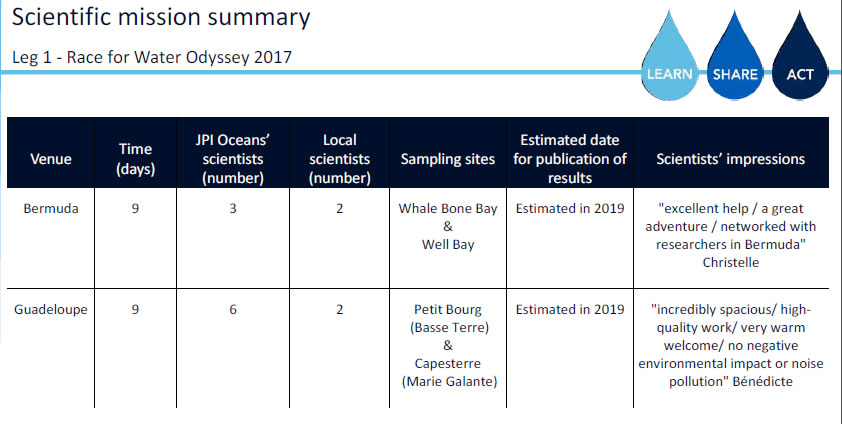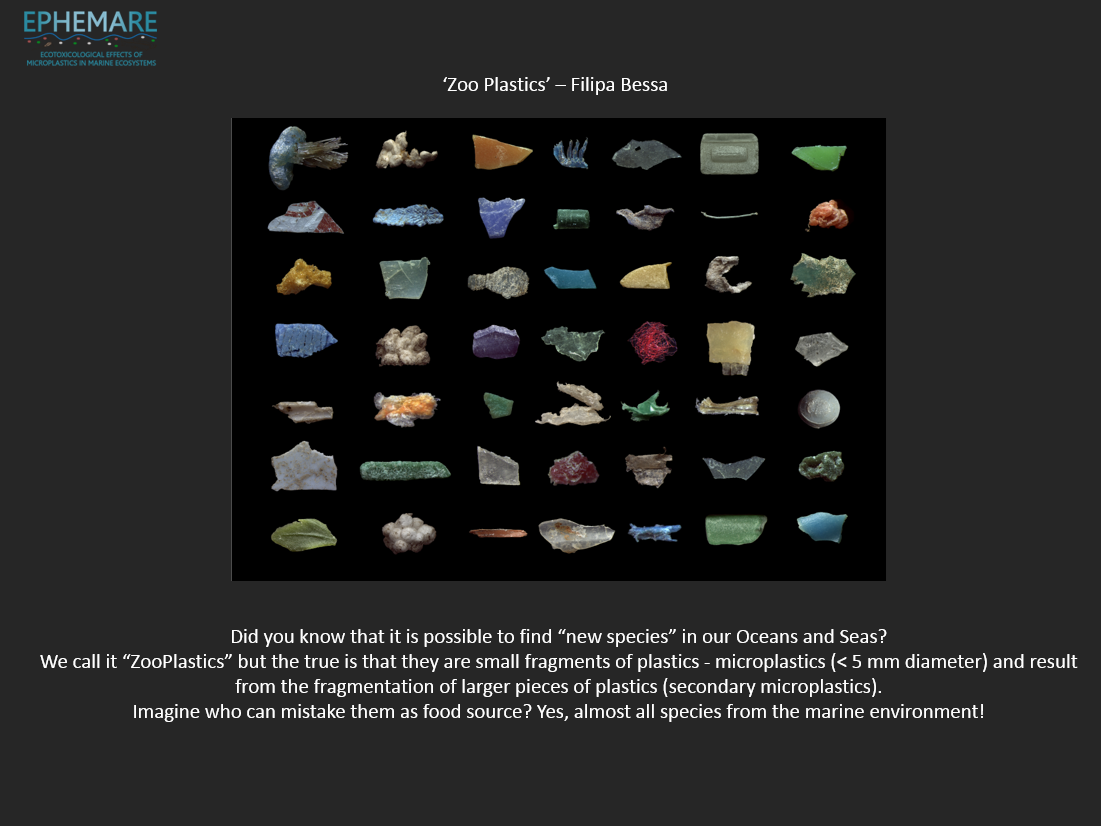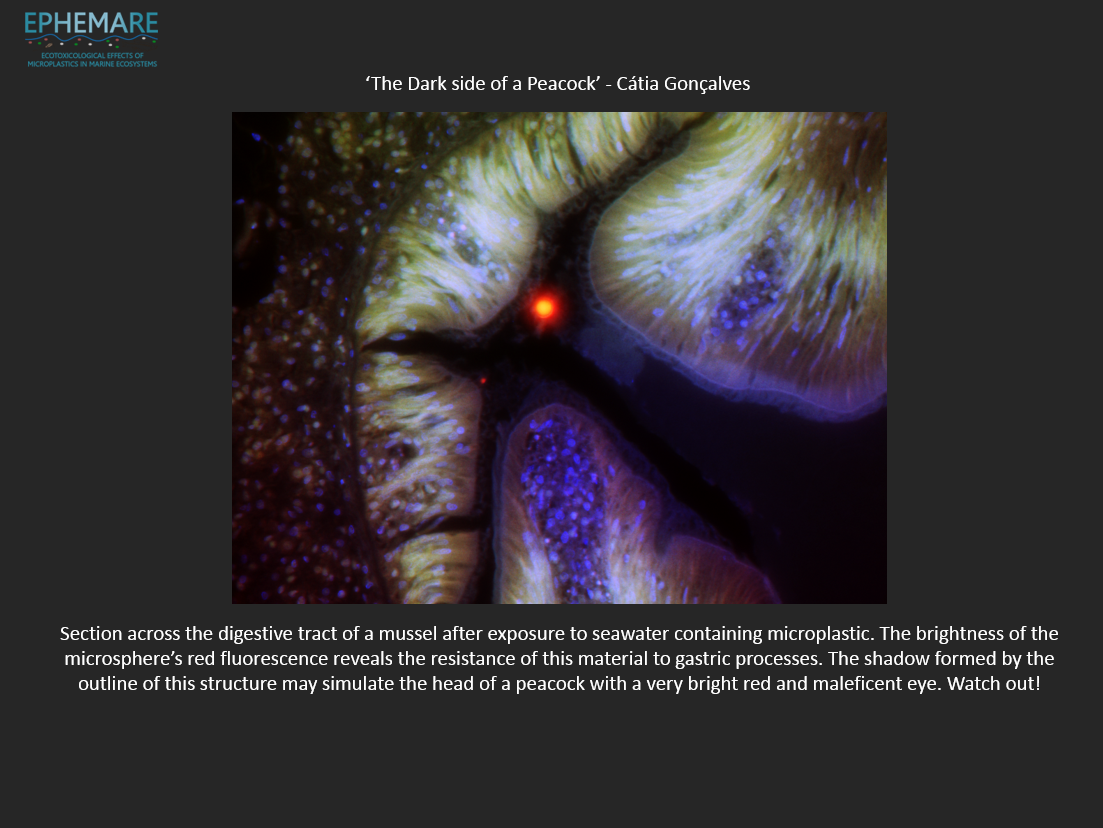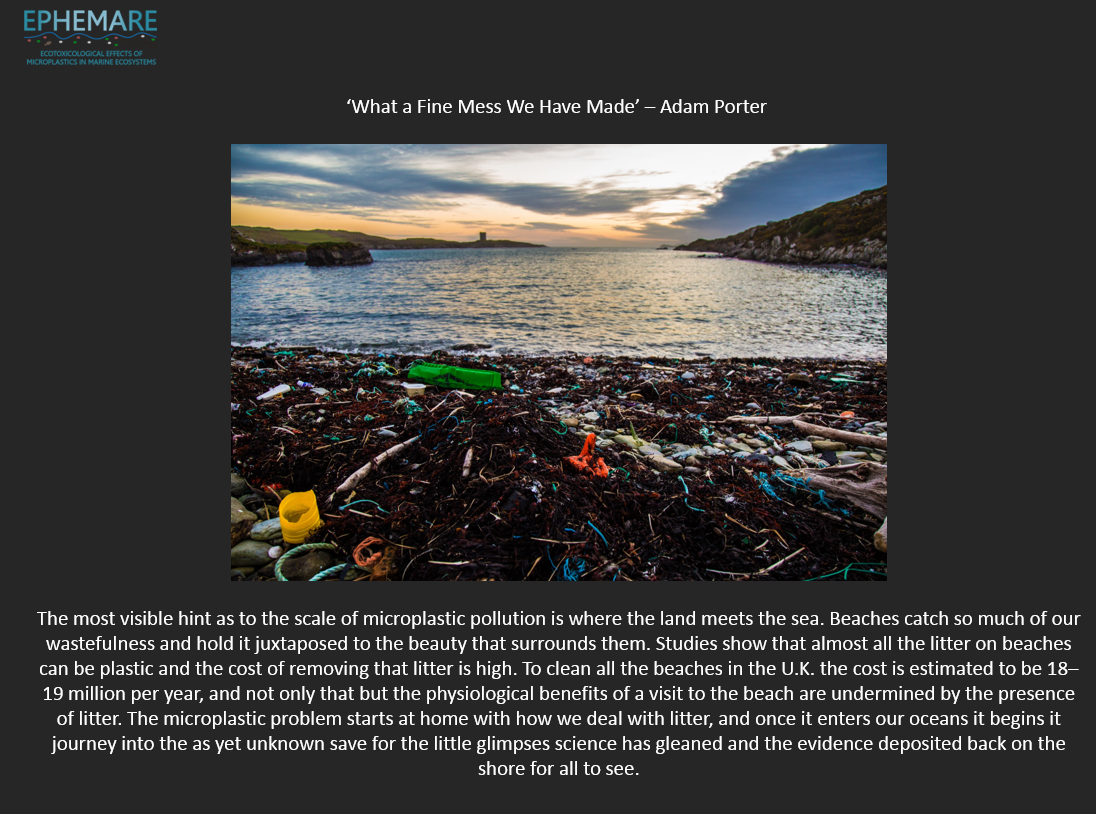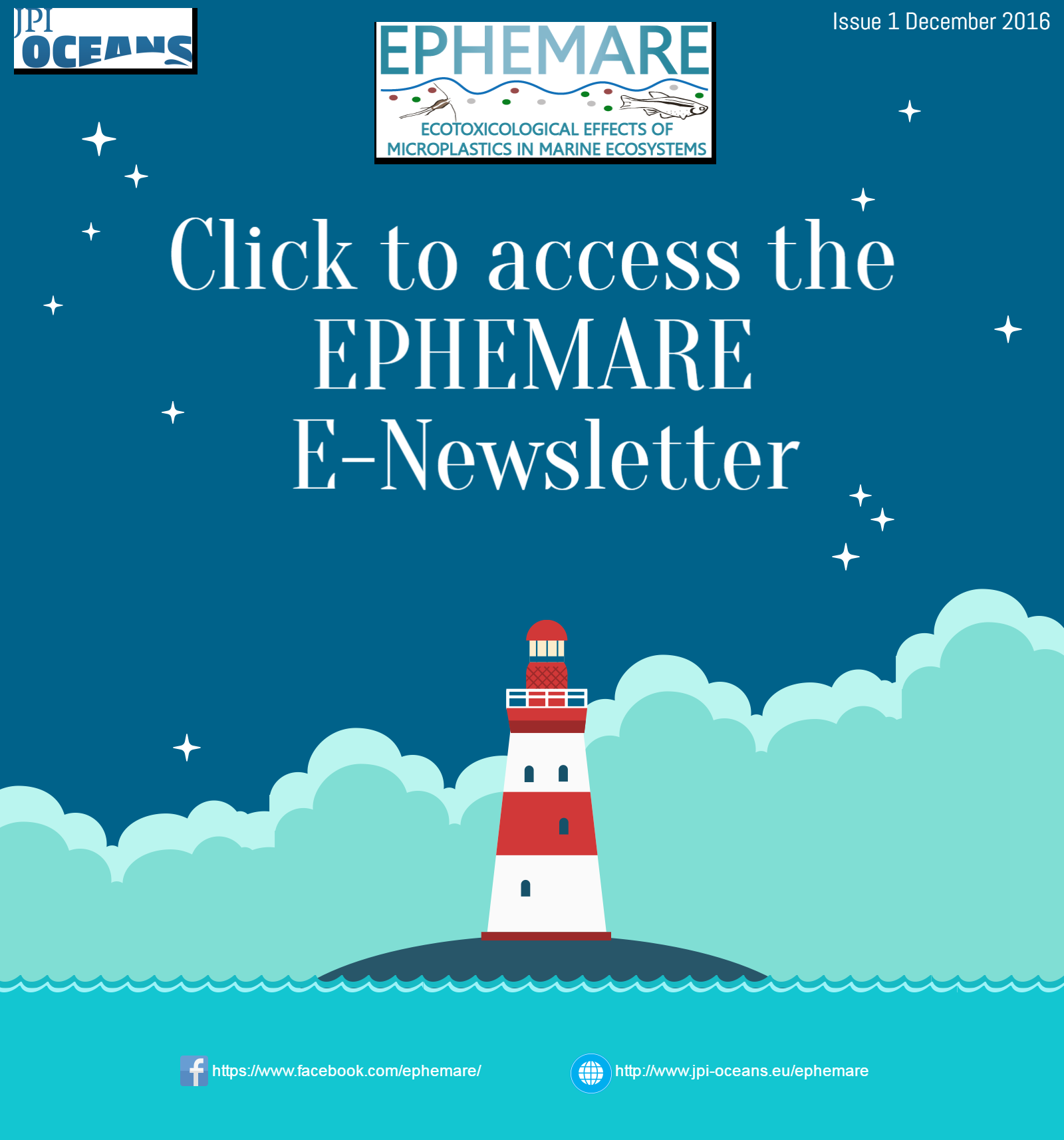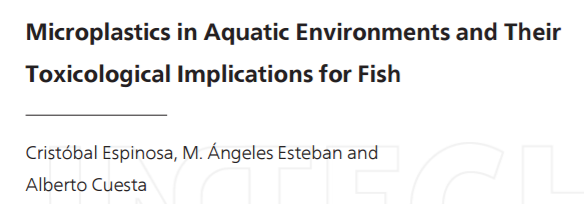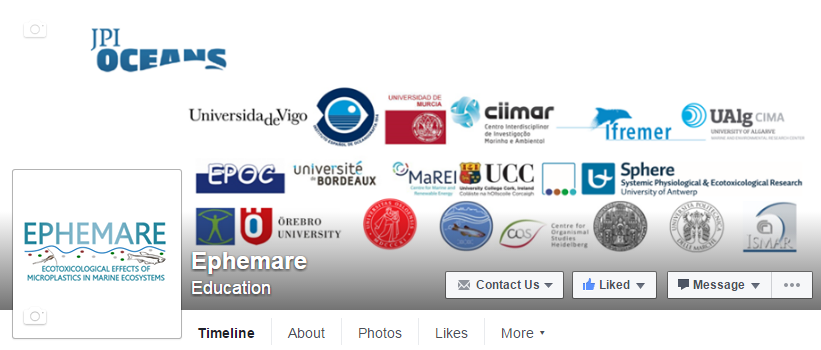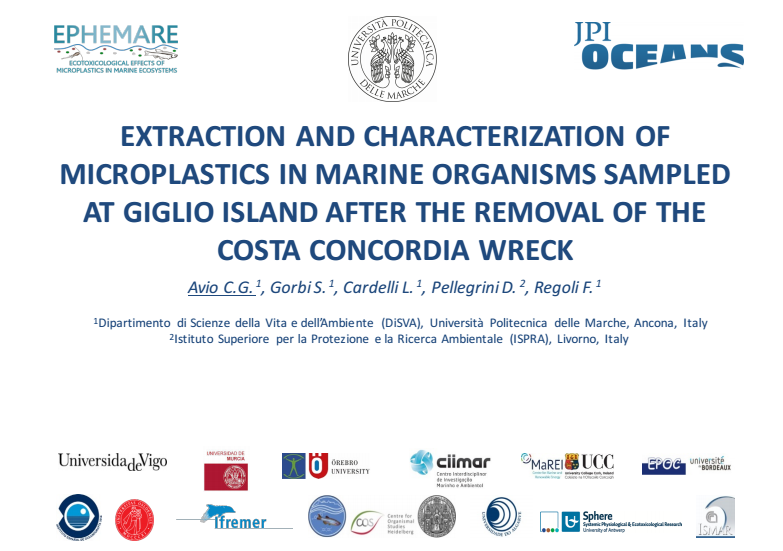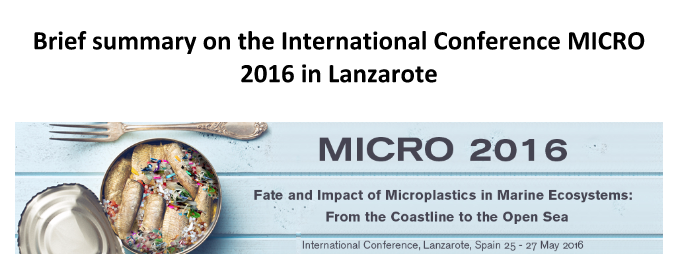News and Events
November 2018
We're here at MICRO2018!
We've had a great start in Lazarote this week as part of MICRO2018. The week kicked off with our final project meeting, where partners from each work package presented their latest findings and summed up three years of research with conclusions from the project.
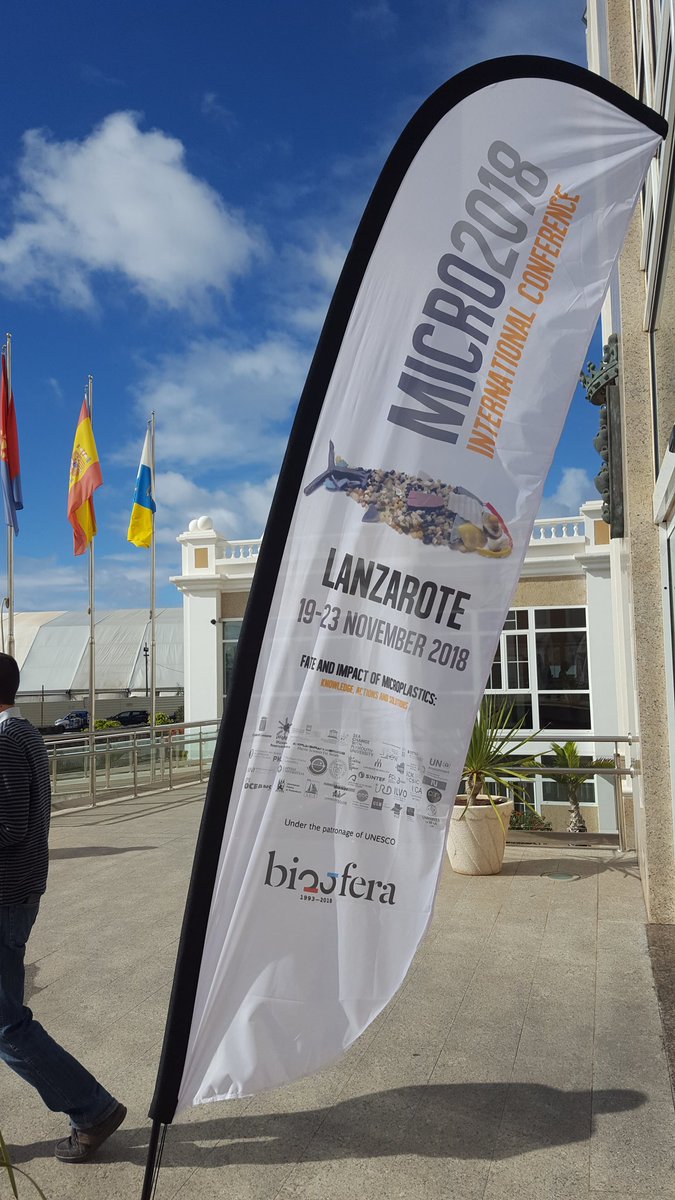
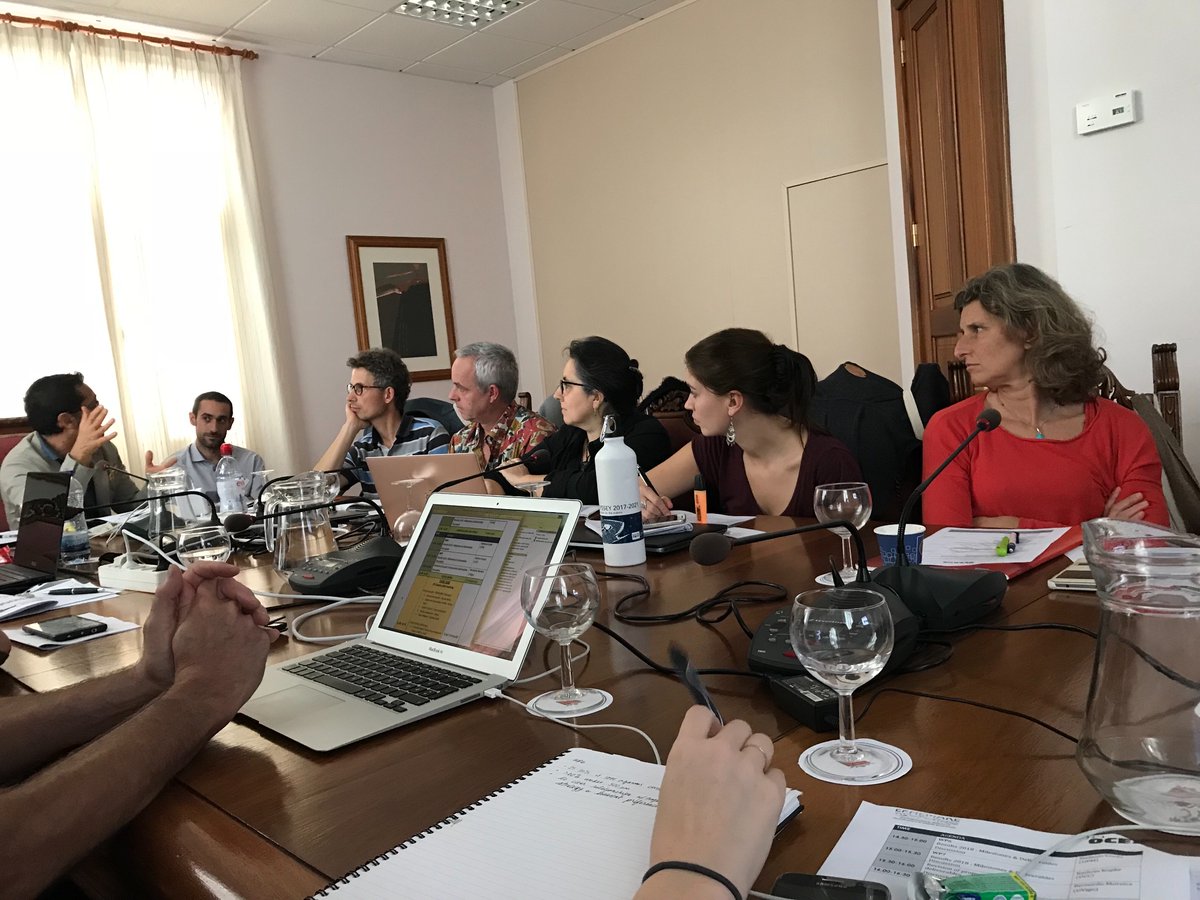
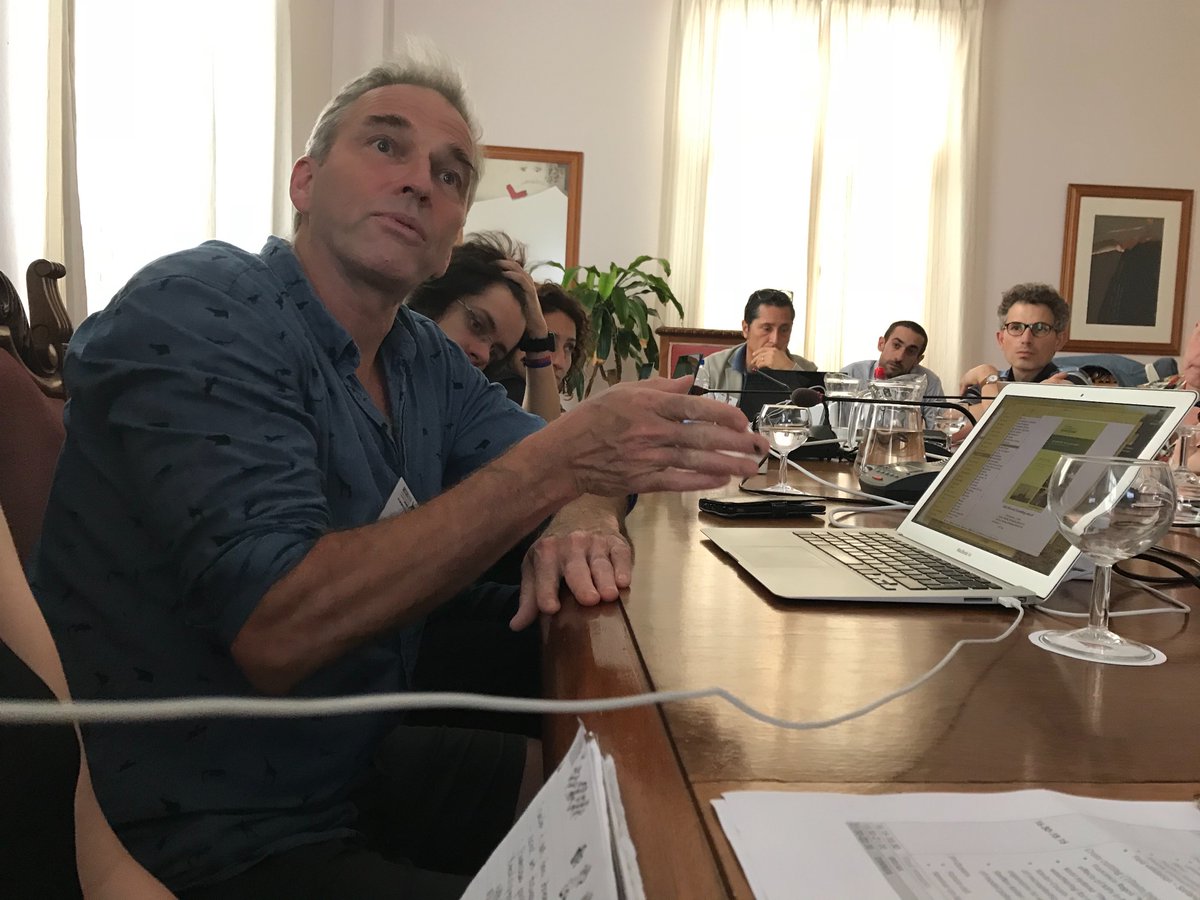
The following day was the final meeting for JPI Oceans' four microplastic projects: EPHEMARE, Plastox, Weather-Mic, and BASEMAN. Researchers from the projects presented their findings from the past three years of work, sharing both challenges and successes. There were some fascinating topics discussed with plenty of questions for future research. For more information, check out our Twitter feed, where we live-blogged each presentation! www.twitter.com/ephemare_
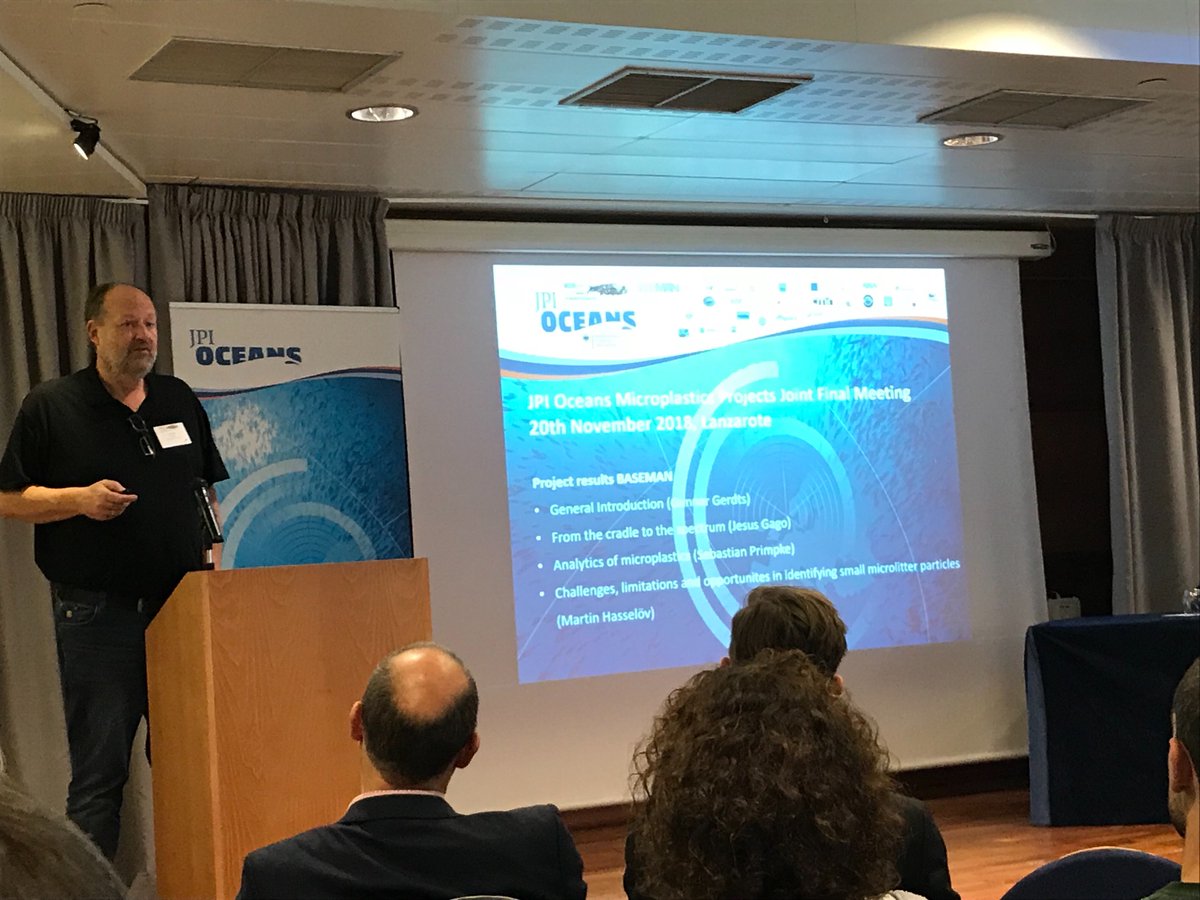
Gunnar Gerdts of BASEMAN on microplastic databases: "We need databases that are public domain and open access."
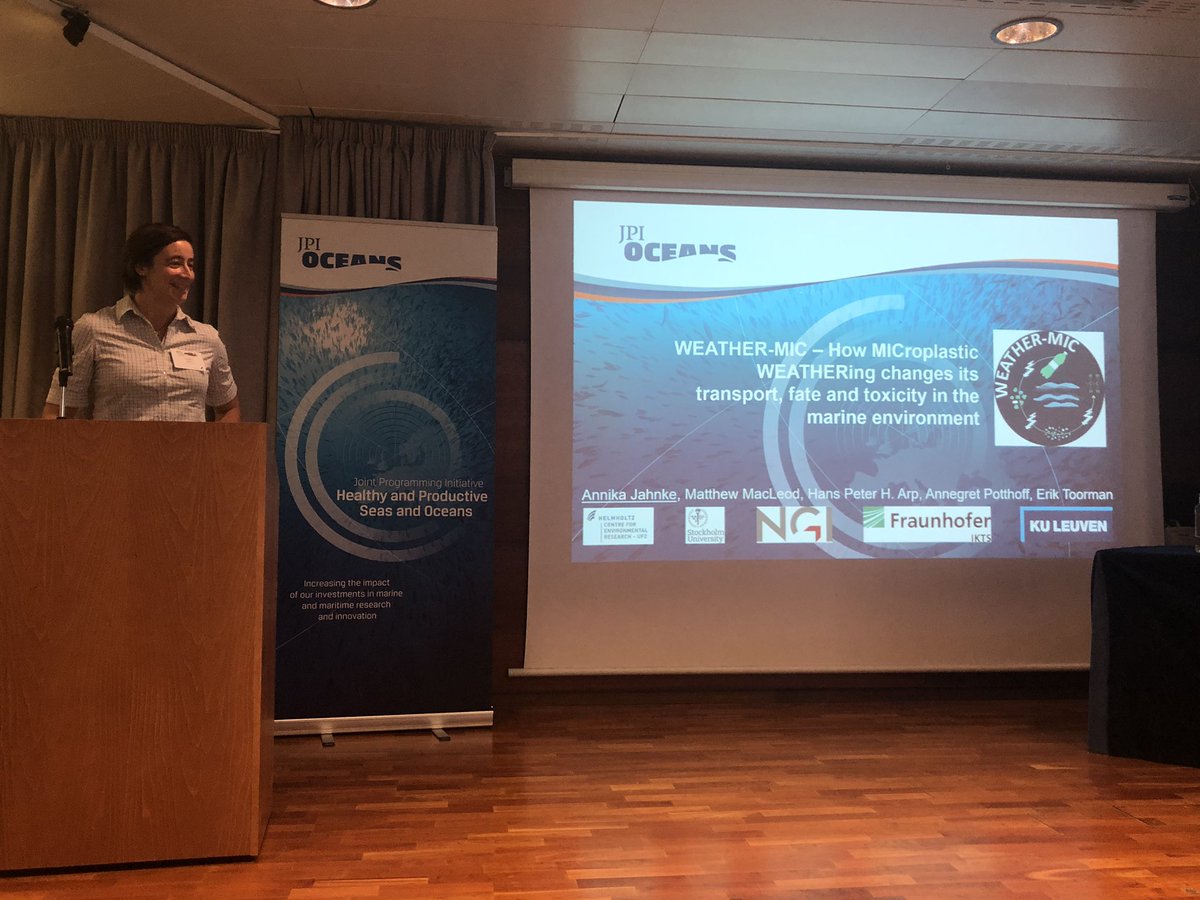
WEATHER-MIC's Annika Jahnke introducing the project and highlighting factors influencing microplastic weathering.
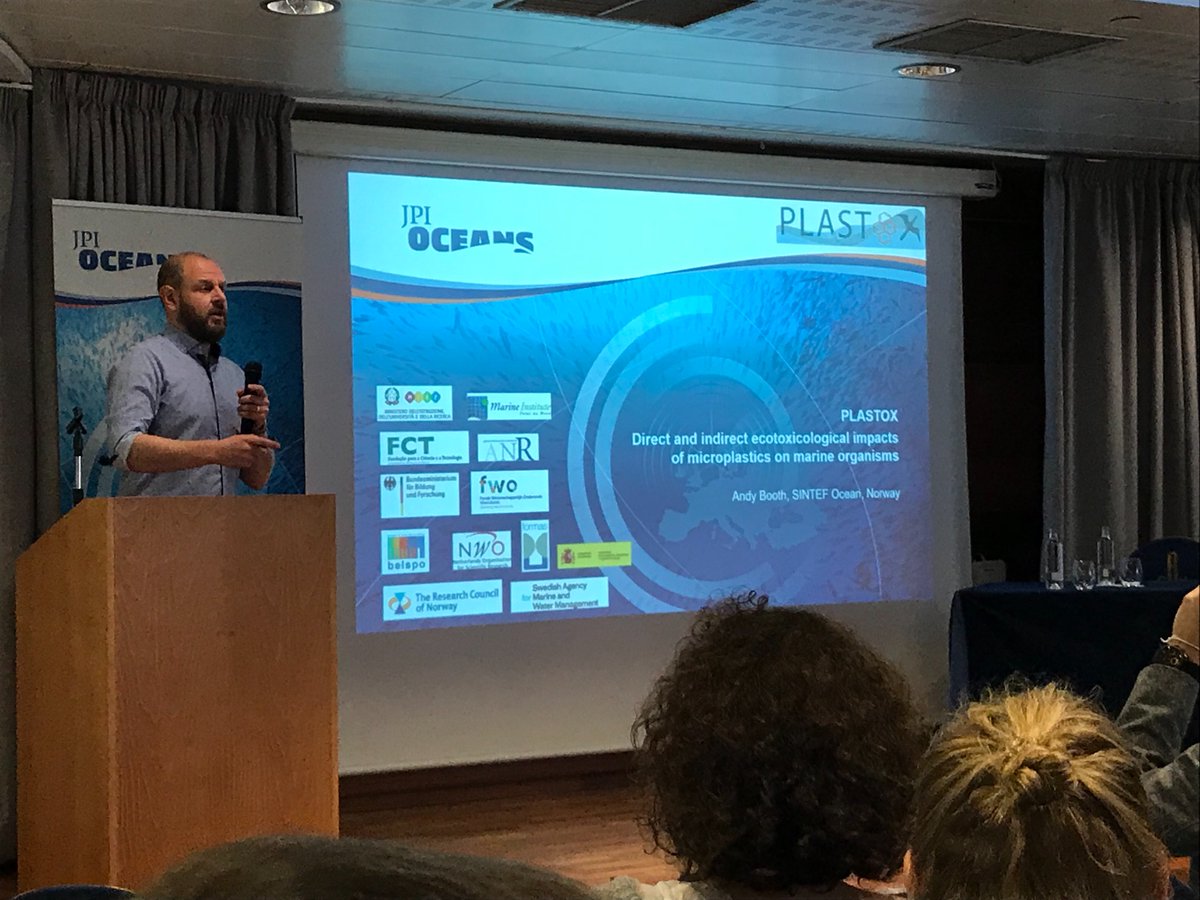
Andy Booth presents ecotoxicology research conducted by PLASTOX.
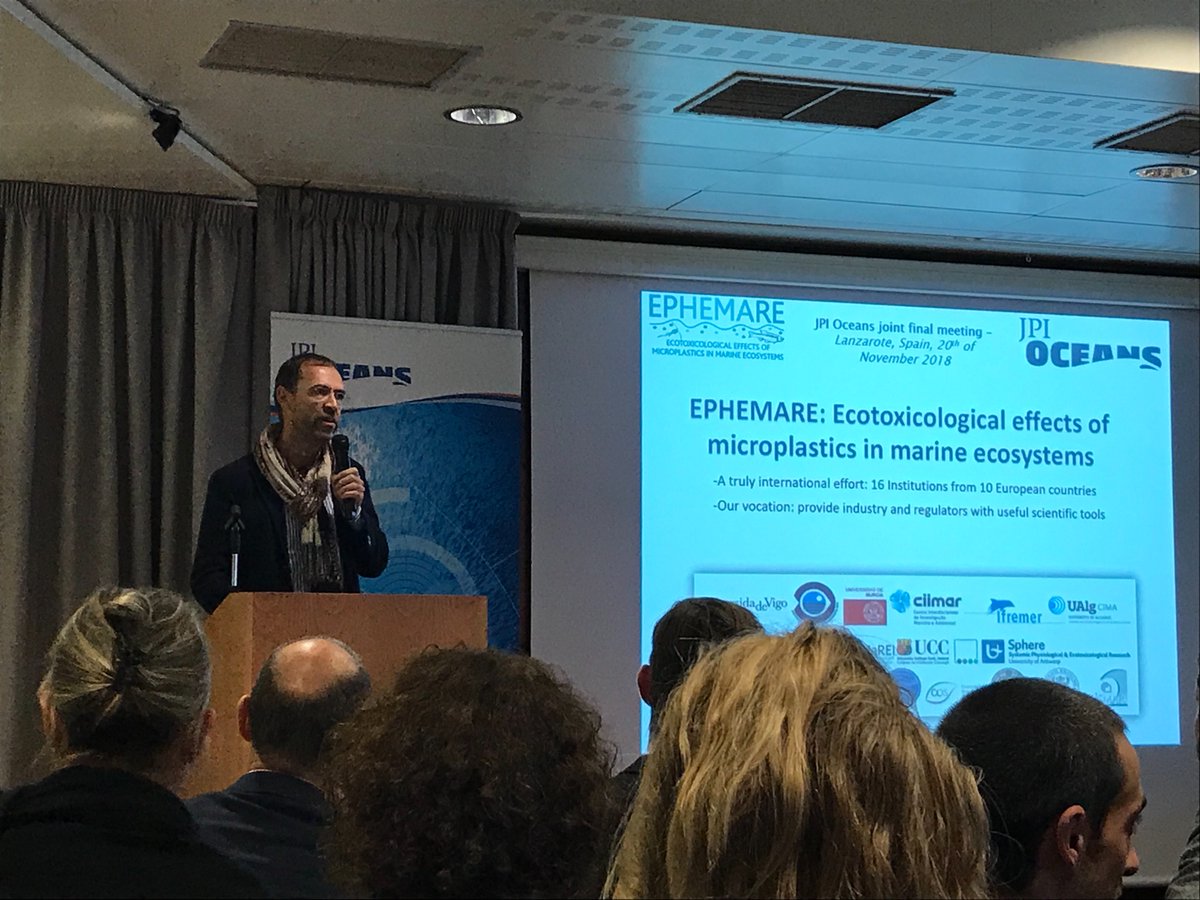
EPHEMARE's Ricardo Beiras introducing the project at the JPI Oceans Panel.
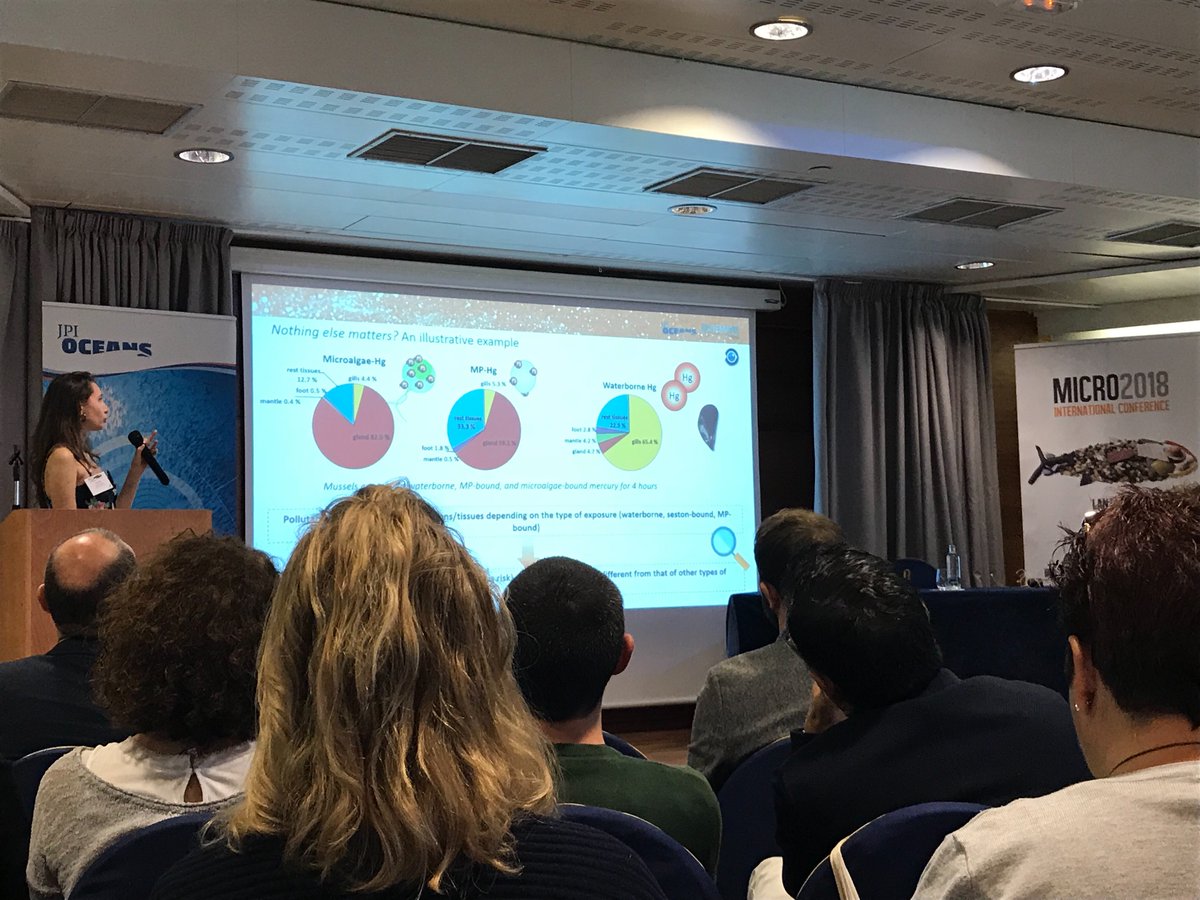
EPHEMARE's Camilla Carteny (University of Antwerp) presents how size, shape, and mode of ingestion influence microplastic uptake.
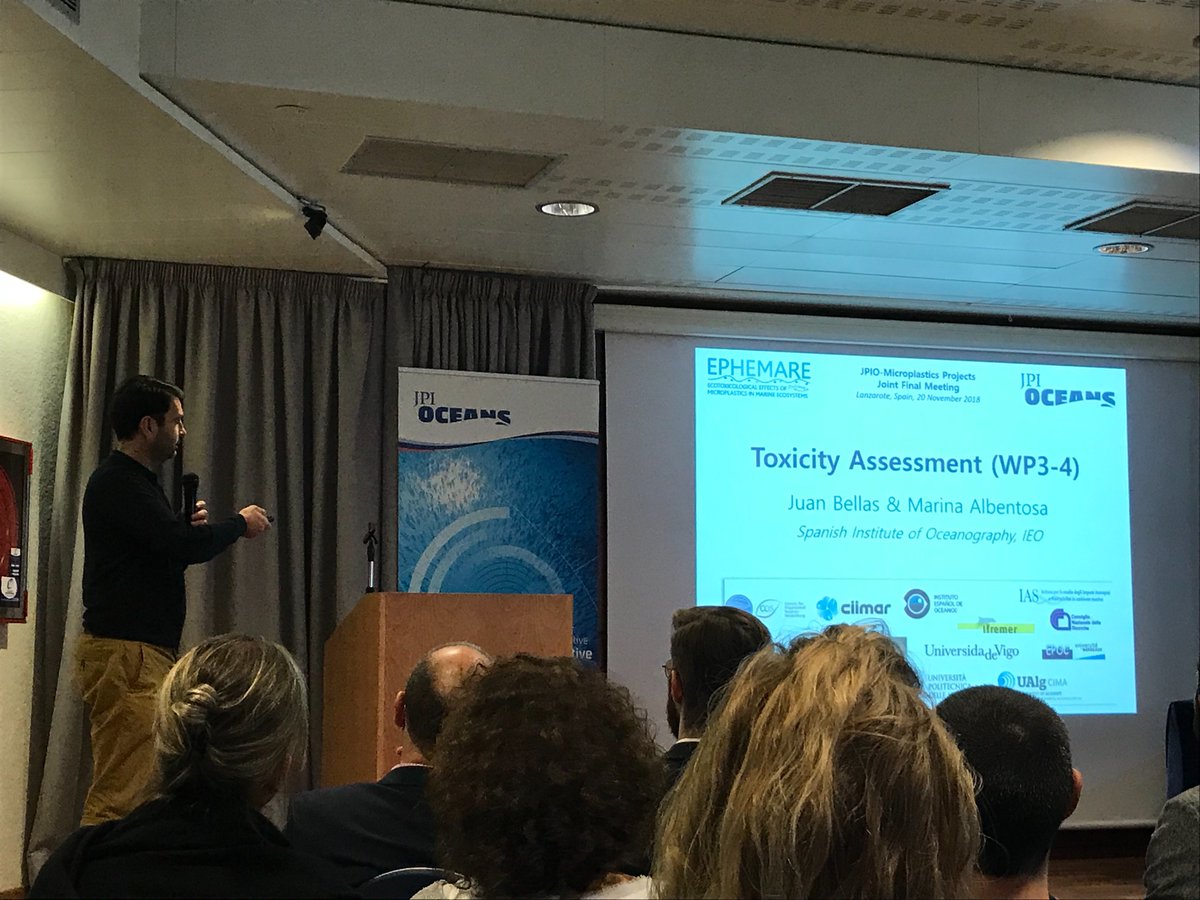
EPHEMARE's Juan Bellas discusses toxicity and reiterates that particle size matters!

Thomas Braunbeck on microplastics as a vector for contaminants: "They glow like a blue lamp!"
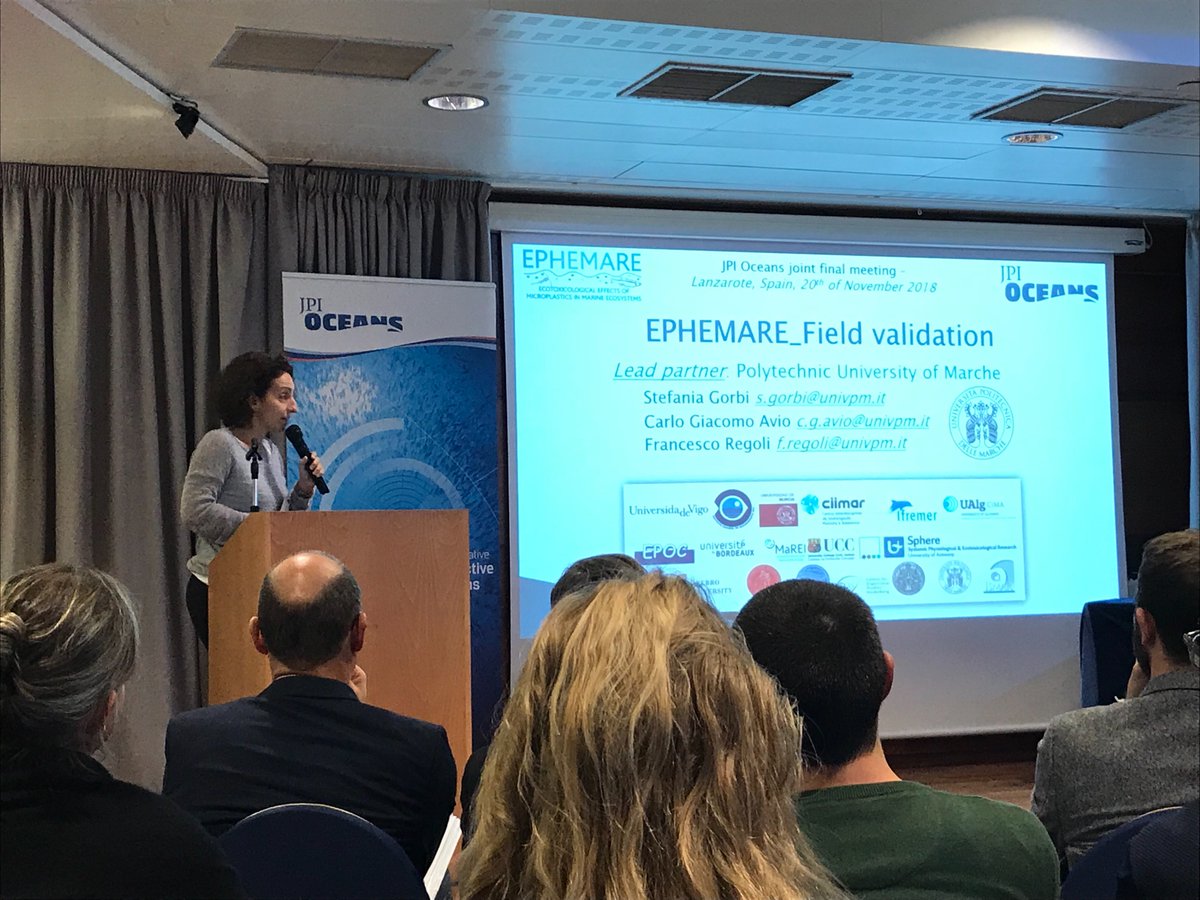
Stefania Gorbia talks field validation: of 1000 organisms analysed, 25-30% were positive for microplastic ingestion.
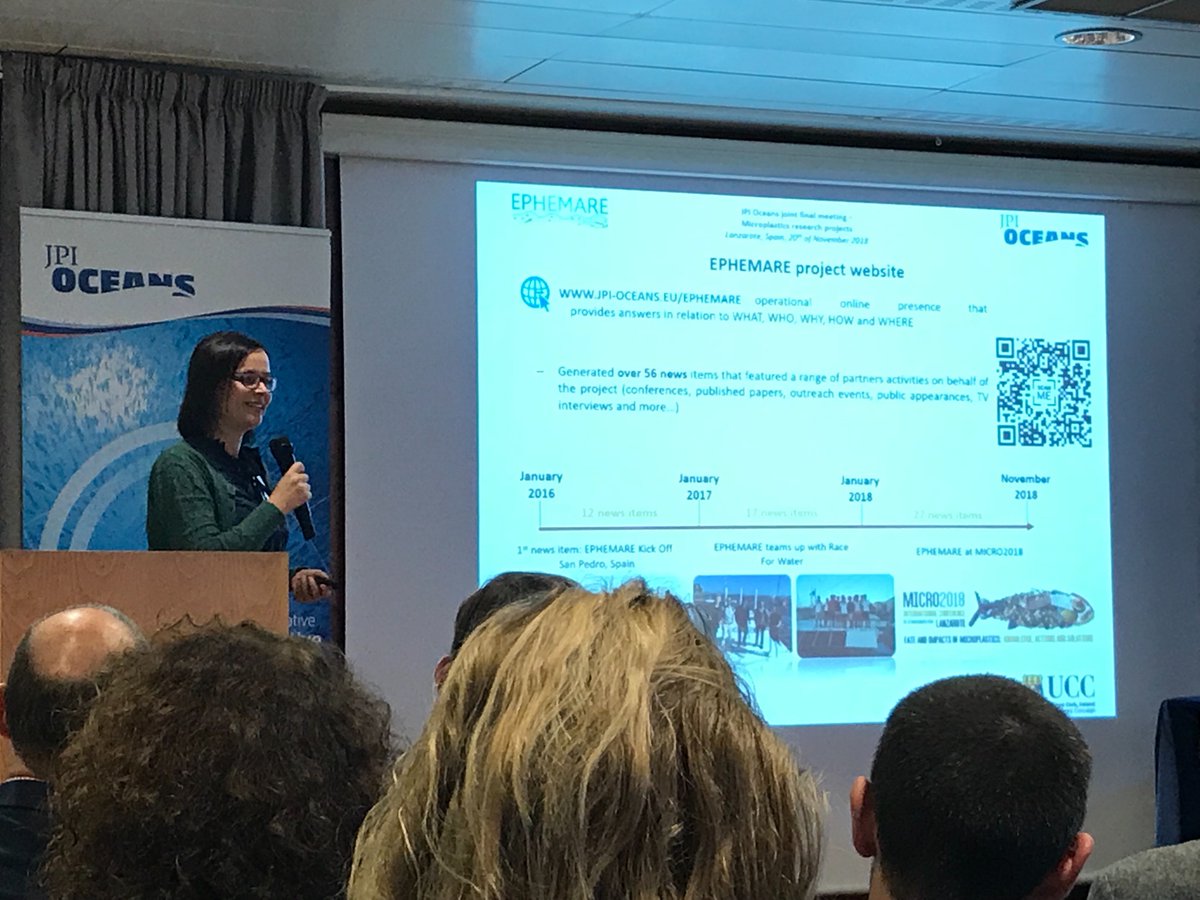
Kathrin Kopke (UCC, MaREI) finishes up EPHEMARE presentations with the importance of dissemination and stakeholder engagement: "In the end, it’s all about the people."
EPHEMARE Poster at MICRO2018
EPHEMARE has completed many enjoyable and successful communications and engagement activities over the lifespan of the project. Check out our poster on "Making microplastics a macro issue: communication and stakeholder engagement in the EPHEMARE project" in the Arrecife Gran Hotel, 1st floor to discover how we made microplastics an important topic.
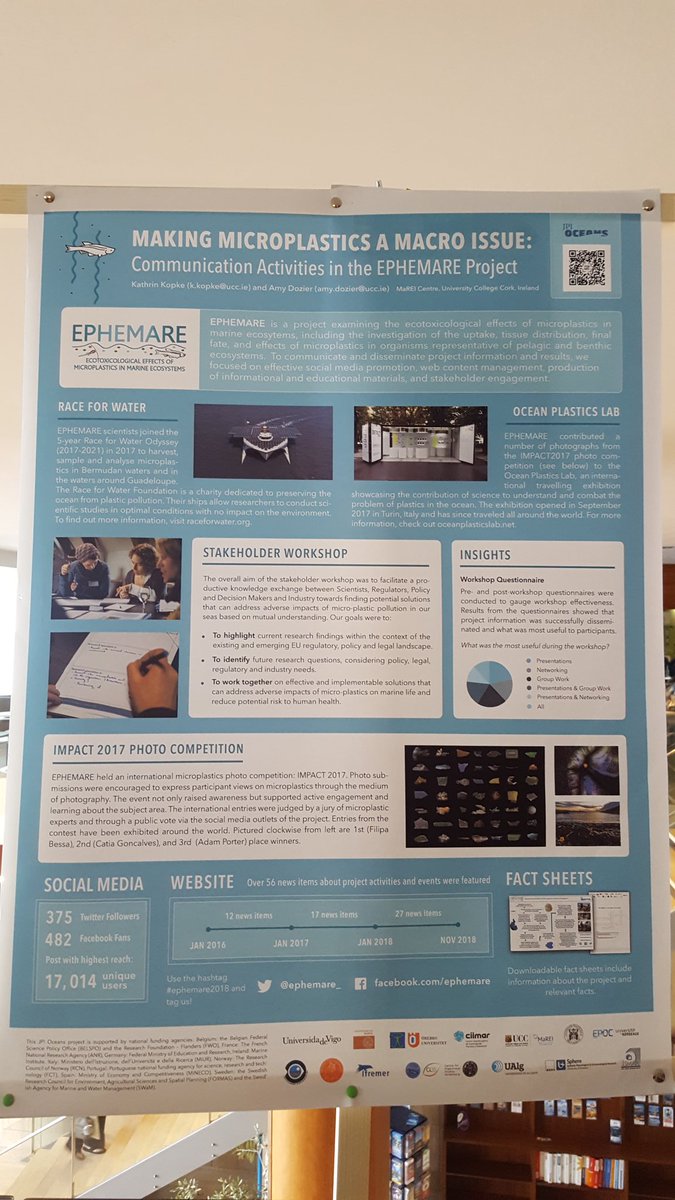
Final Meeting of JPI Oceans' Microplastic Projects
EPHEMARE researchers will be at the final meeting of the JPI Oceans microplastics projects on the 20th of November. The joint final meeting will be held alongside the MICRO2018 conference in Lanzarote. For more information, follow this link: http://www.jpi-oceans.eu/events.
EPHEMARE at MICRO2018
 EPHEMARE researchers will be in attendance at MICRO2018, "Fate and Impact of Microplastics: Knowledge, Actions and Solutions," in Lanzarote, Spain from 19 – 23 November 2018. EPHEMARE will be contributing to the following exciting panels.
EPHEMARE researchers will be in attendance at MICRO2018, "Fate and Impact of Microplastics: Knowledge, Actions and Solutions," in Lanzarote, Spain from 19 – 23 November 2018. EPHEMARE will be contributing to the following exciting panels.
- November 21 - Panel 13.3 (16h30 - 18h30) : A STANDARD PROTOCOL FOR THE ASSESSMENT OF MICROPLASTICS TOXICITY USING PLANKTONIC MARINE ORGANISMS. Ricardo Beiras et al. , > 222462
- Nov 22 - Panel 16.2 (10h30 - 12h30) : Putting the ‘Work' back into Workshop – the EPHEMARE stakeholder workshop on microplastics in the marine environment. Kathrin Kopke, Sophie Power and Camilla Catarci Carteny > 220611
- Nov 22 - Panel 16.2 (10h30 - 12h30) : "Less plastic, more Mediterranean" - a research and awareness campaign in the Mediterranean Sea. Francesca Garaventa et al. > 222578
- Nov 22 - Panel 16.1 (10h30-12h30) : Do microplastics in marine sediments affect inbenthic organisms? Ketil Hylland , > 222622
- Nov 22 – Panel 17.2 (14h30 - 16h) : Differential effects of pollutant-spiked microplastics on two model fish, zebrafish and marine medaka. Bettie Cormier et al., > 222377.
- Nov 22 - Panel 18.2 (16h30 - 18h30) : Furthering the dynamic uptake model for virgin microplastics: application to the blue mussel (Mytilus edulis). Camilla Catarci Carteny et al., > 222603
- Nov 22 - Panel 22.1 14h30-16h30: Physiological consequences of chronic exposure of marine medaka to microplastics. Florane Le Bihanic et al., > 220350
- Nov 23rd – Panel 22.1: 14h30' – 16h30': Assessing the impact of environmental microplastics in fish using cell line, embryos, larvae and juvenile. Bénédicte Morin et al., > 222403
We hope to see you there!
October 2018
Two EPHEMARE papers by our colleagues from the Aquatic Ecology and Toxicology Section, Centre for Organismal Studies, University of Heidelberg
EPHEMARE researchers Patrick Heinrich and Thomas Braunbeck from the University of Heidelberg have published two papers related to the study of ecotoxicology in-vitro.
The first, "Genetically engineered zebrafish liver (ZF-L) cells as an in vitro source for zebrafish acetylcholinesterase (zfAChE) for the use in AChE inhibition assays", presents a cell-based in-vitro test system that appears as a valuable complementation to earlier approaches based on zebrafish embryos. the ZF-L-based approach presented is a truly animal-free source for zfAChE enzyme preparations and avoids problems associated with the not yet completely characterized aspects of embryonal bioavailability, biotransformation and compensation mechanisms. More elaborate comparisons between the two test systems with focus on the impact of bioavailability and biotransformation as well as with respect to the relative sensitivity of the two alternative systems are subject of further ongoing research.
Read the publication here: https://www.sciencedirect.com/science/article/pii/S0887233318302297.
The second, "Microplastic testing in vitro: Realistic loading of pollutants, surfactant-free solid surface-dosing and bioanalytical detection using a sensitivity-optimized EROD assay", builds on the previous work and introduces a novel approach for loading of pollutants to microplastics (MP) based on solid-phase-extraction and dry surface dosing of MP for the detection of associated effects. Benzo[k]fluoranthene was found to bind to polyethylene with high efficiency, whereas only a small fraction was found bioavailable under in vitro test conditions. The in vitro approach can technically be deemed suitable for further investigations into toxicity effects by chemicals associated with MP.
Read here: https://www.sciencedirect.com/science/article/pii/S0887233318304144.
Patrick Heinrich and Thomas Braunbeck will also be submitting to Environmental Science & Technology (ES&T) the following paper: Microplastic as a pollutant vector in vitro: Role of adsorpt lipophilicity, modulation by surfactants and evidence for detoxification by virgin particles.
What can we learn from these studies?
Their results show that MP-bound substances can be taken up by cultured cells, however this is strongly dependent on the substances' lipophilicity. Against the background provided by other works on sorption of pollutants to MPs, it appears likely that substances on MPs which are highly bioavailable will not accumulate under natural conditions and vice versa substances strongly accumulated by MPs will probably not be efficiently released in biological systems. Under certain circumstances (clean plastic added to an already exposed system), MP may actually detoxify organisms by competing for pollutants, in fact reducing effects caused by environmental pollutants. Also, according to preliminary experiments (to be concluded shortly), we found that the MPP-MPs used in the project appear not to be taken up by trout macrophages, indicating that accumulation of MPs with this particular chemistry in this size range in tissues of fish is unlikely. Consequently, it appears reasonable to rather worry about the pollutants present in and released to the environment than about MP themselves.
EPHEMARE at the Italian Festival of Science!
Ephemare researchers from CNR-ISMAR participated in an educational laboratory (title: “Plastic Changes”) at FdS2018 in Genova, Italy, from 25 October - 5 November. The lab aimed to realize a journey through plastic life cycle to promote its responsible use and the possibilities of recycling and re-using. It was organized by CNR and supported by PlasticEurope (European Federation of plastic manufacturers). The main results of Ephemare's studies were also exhibited.
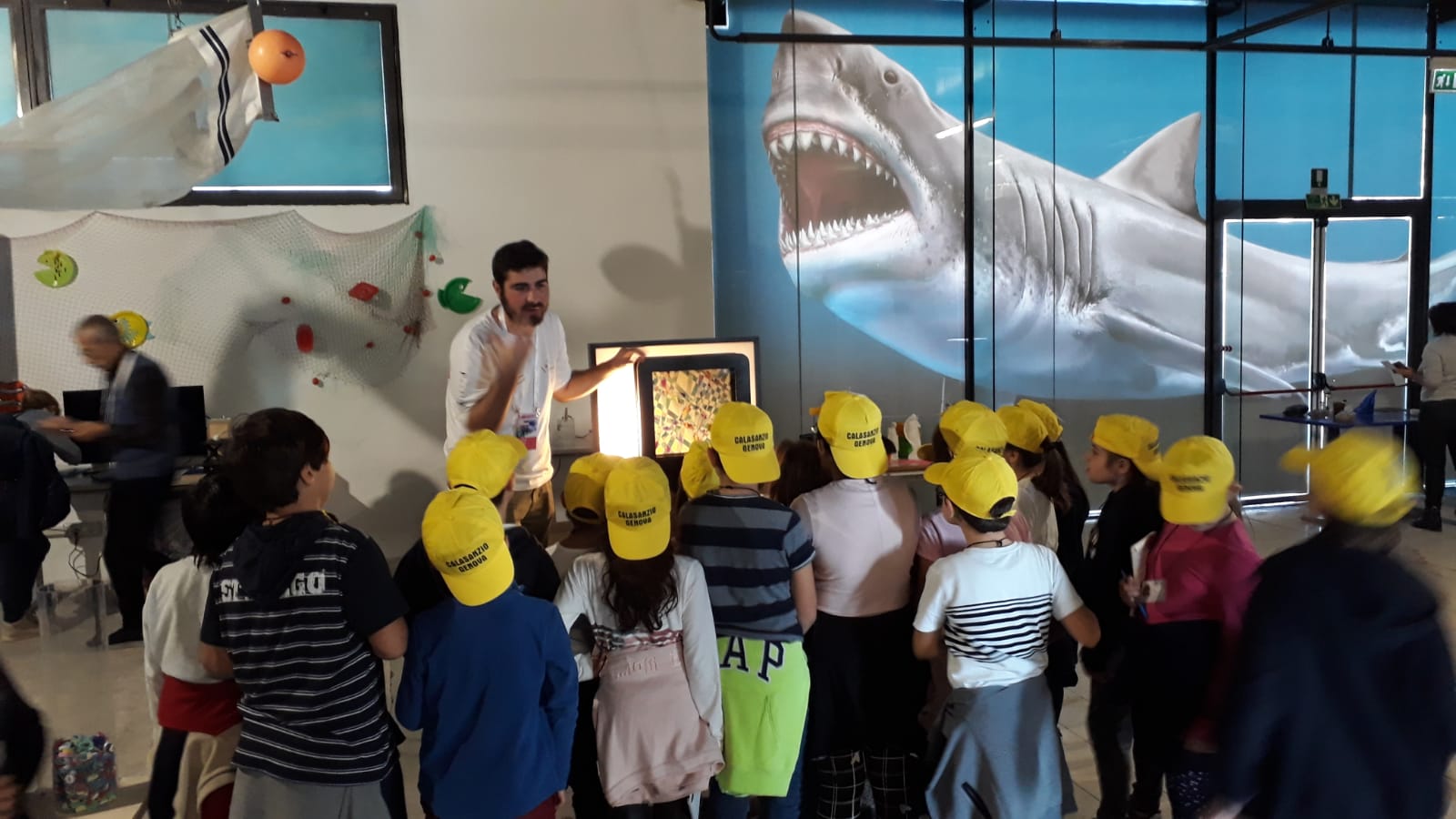
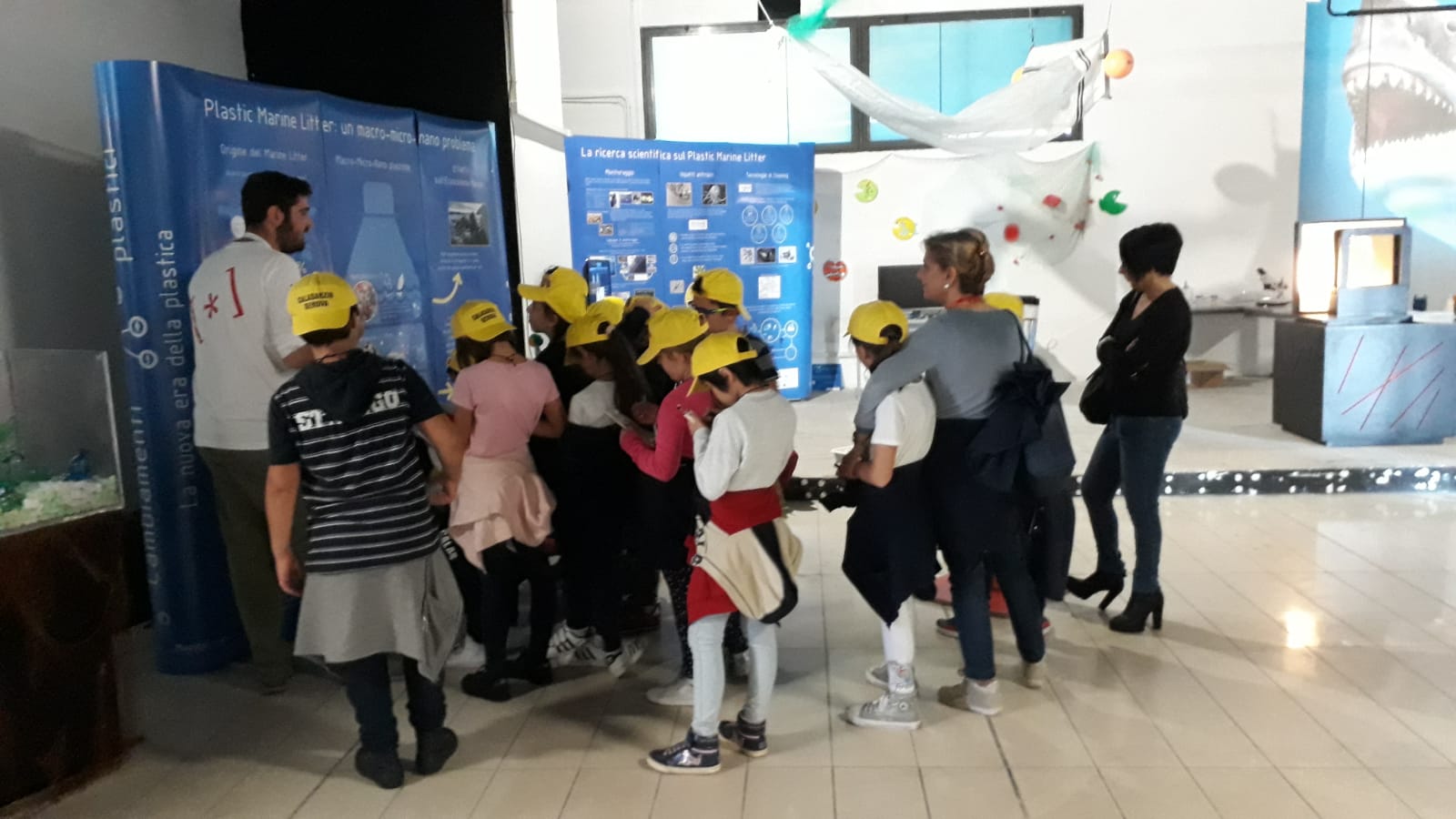
In addition, Ephemare researchers from UPM and Marco Faimali and Francesca Garaventa from CNR-ISMAR participated in a conference under the title: “Less Plastic, More Mediterranean."
Learn more about the event at http://www.festivalscienza.eu/site/en/home.html.
New Paper on the Effects of Microplastics on Zooplankton
EPHEMARE researchers at CNR-ISMAR contributed to a collaborative paper coordinated by Ricardo Beiras on the effect of microplastics on zooplankton:
Beiras R., Bellas J., Cachot J., Courmier B., Cousin X., Engwall M., Gambardella C., Garaventa F., Keiter S., Le Bihanic F., Lopez-Ibanez S., Piazza V., Rial D., Tato T., Vidal-Linan L., 2018. Ingestion and contact with polyethylene microplastics does not cause acute toxicity on marine zooplankton. J. Haz. Mater. 360, 452-460).
Included were results of the Ephemare project demonstrating that polyethylene microplastics are ingested by several zooplankton but do not cause acute toxicity. Read the paper here: https://www.sciencedirect.com/science/article/pii/S0304389418306617.
Maker Faire 2018
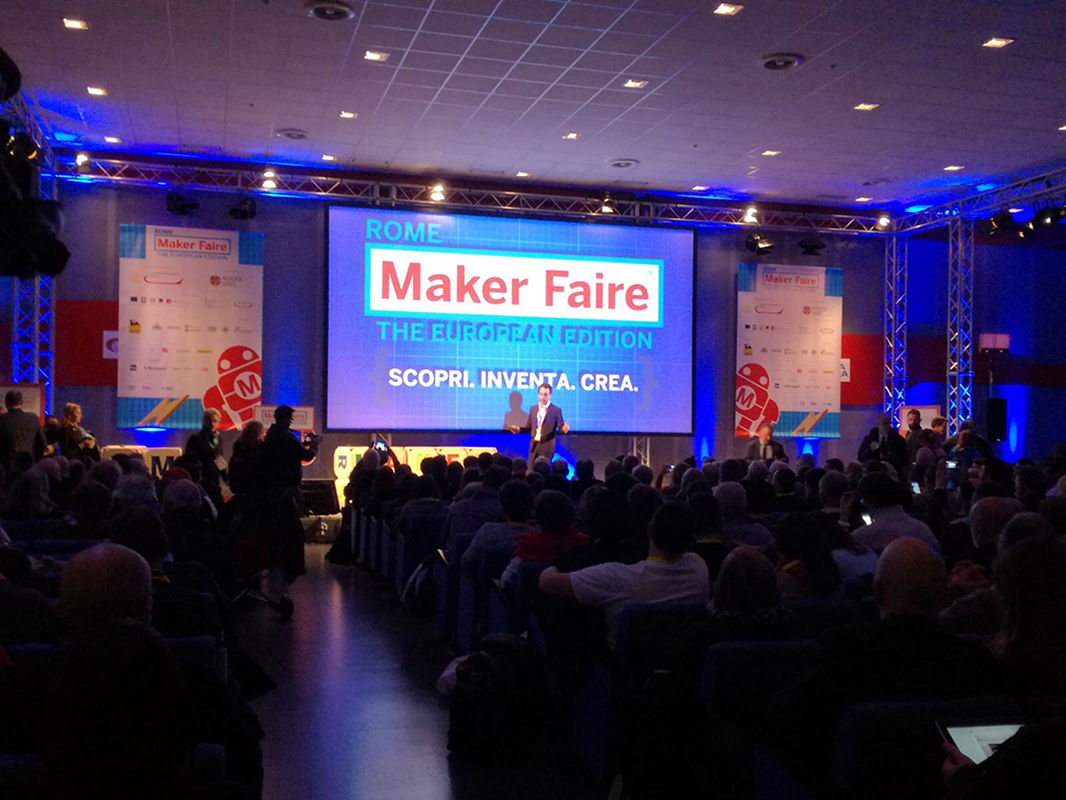
Ephemare researchers from CNR-ISMAR were present at Maker Faire 2018 in Rome, Italy with a stand dedicated to explain the problem of marine litter in the environment and the Ephemare project. Moreover, Marco Faimali presented during the event a talk entitled “IAS – CNR: a scientific approach to the problem of microplastics in the sea”.
Link: https://2018.makerfairerome.eu/it/
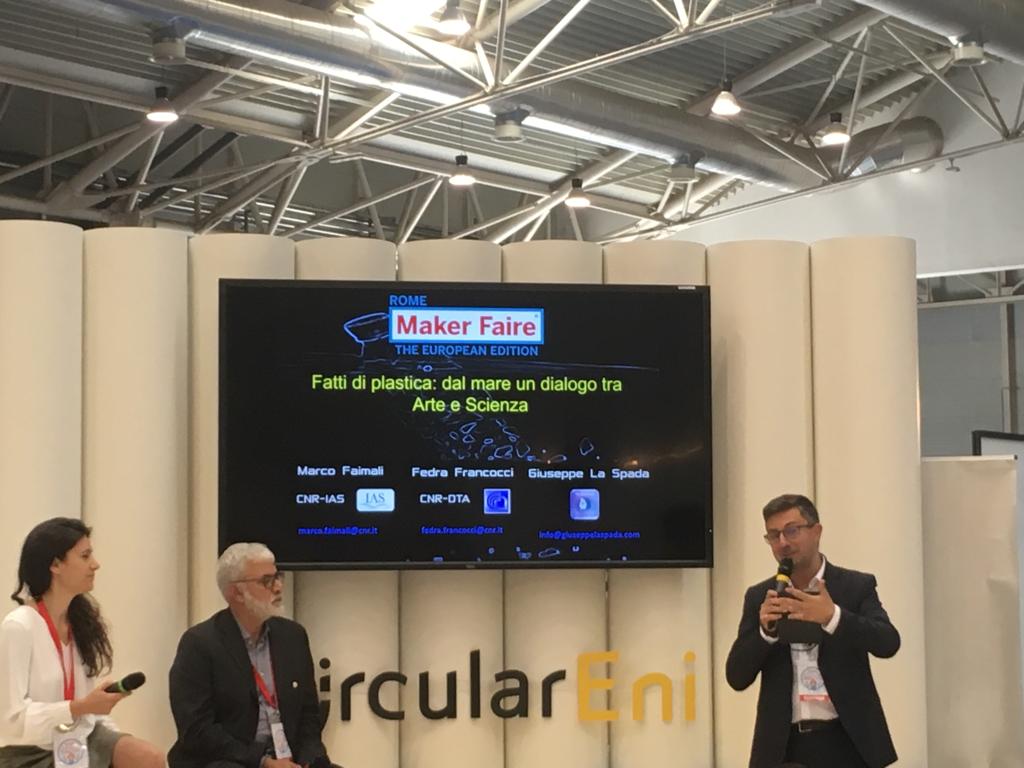
August 2018
EPHEMARE researchers from CNR-ISMAR attended La Festa del Mare in Rapallo, Italy from 8-11 August, 2018 with an educational laboratory on the life cycle of plastic. The workshop highlighted ways to re-use and recycle plastic, while promoting responsible use. Results from WP3 and WP5 were also exhibited. Check out La Festa del Mare at http://www.lafestadelmare.com.
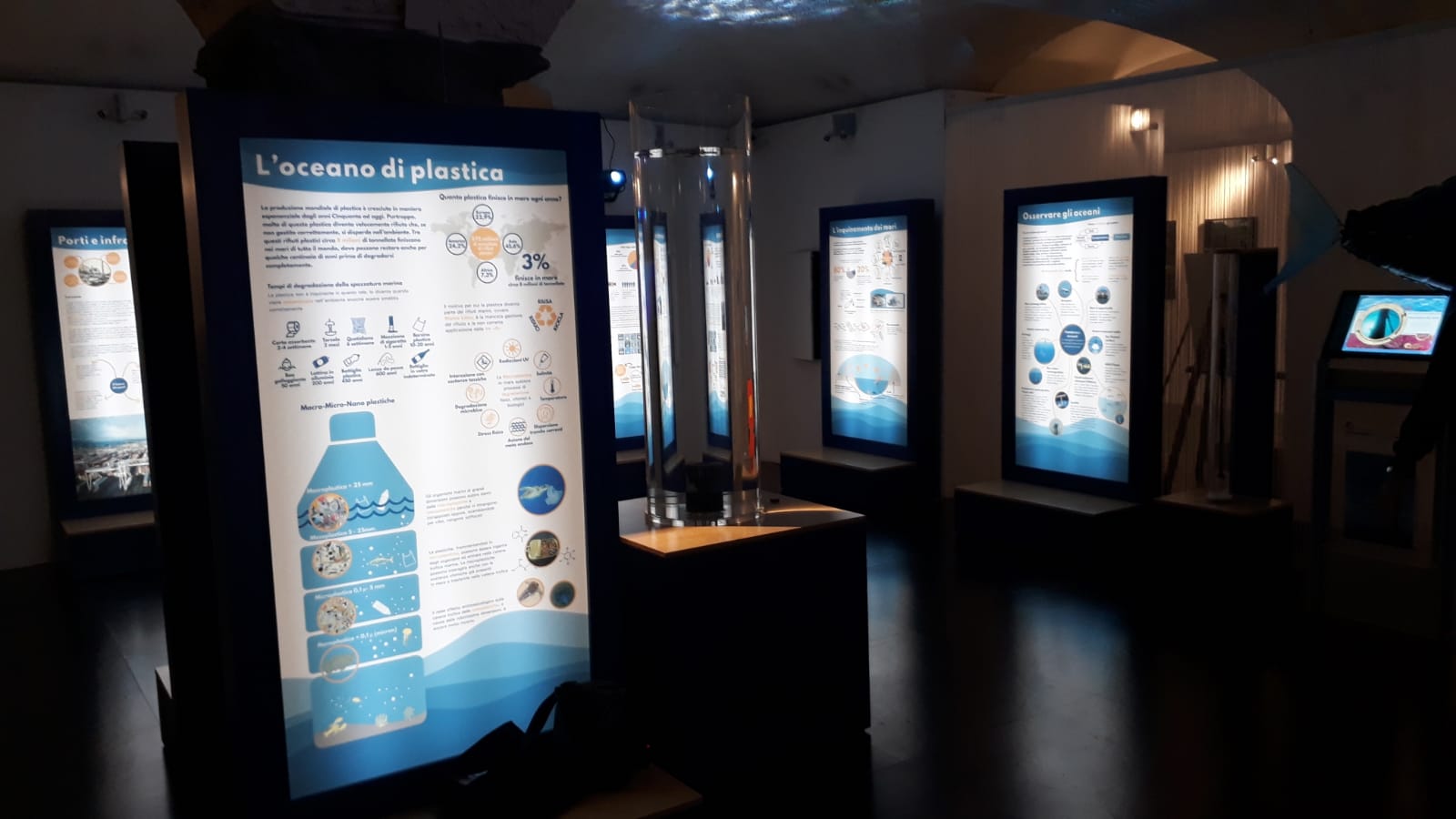
July 2018: Care for Some Ephemarinaras?
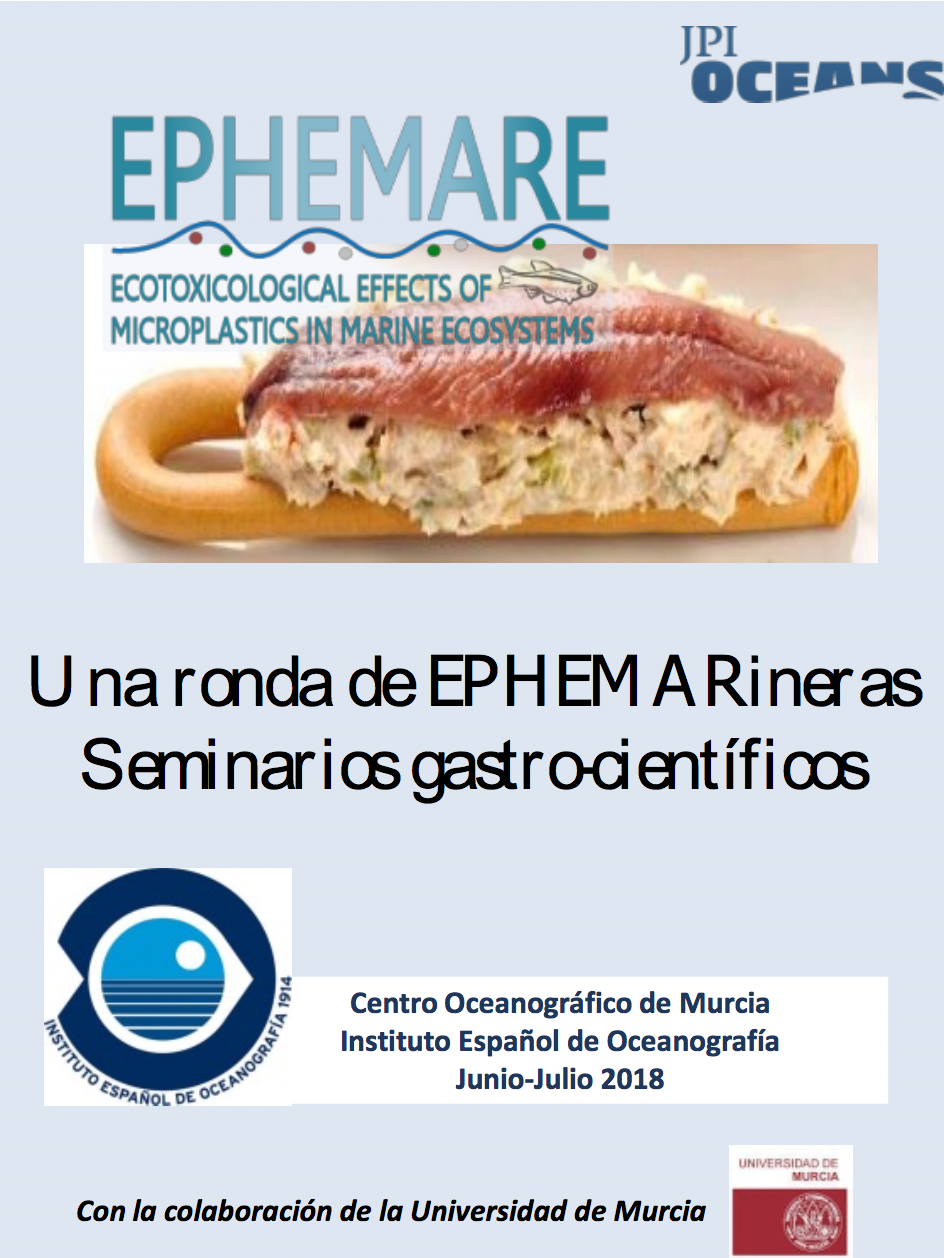
Over June and July, EPHEMARE has given several informative and entertaining seminars about the project at The Oceanographic Center of Murcia (COMU). The presentations took the format of a gastro-scientific seminar to go along with COMU's Friday 'tapas' series. These events are part of the current "Pint of Science" initiative, designed to disseminate scientific work to science and beer lovers.
Among the most characteristic tapas of the Mercia region is the marinera (Russian salad mounted on a bread donut and topped with an anchovy), so this fun and charming series was titled 'A round of EPHEMARineras'.
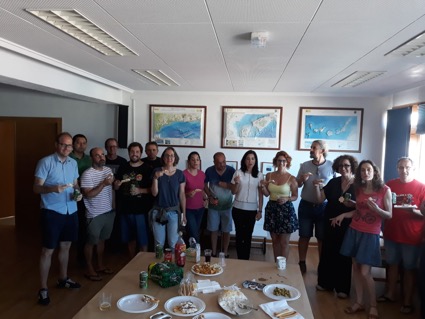
Also in July, EPHEMARE researchers from UPM gave their 2nd training course in Ancona, Italy, on the extraction and characterisation of microplastics from marine organisms. The event was coordinated by C. G. Avio, L. Pittura, S. Gorbi, and F. Regoli, and with the technical support of Perkin Elmer Italia.
June 2018
Latest Events and Conferences
EPHEMARE's researchers at CNR-ISMAR participated in the organization of the conference “Made of Plastic” (Rome, Italy 05/06/2018). Within the Environment World Day 2018 “Beat Plastic Pollution”, Ephemare organized an event entitled “Made of Plastic”, which aimed to attract people’s attention to plastic pollution. Marco Faimali presented a talk entitled “CNR research activities on Marine Litter and Ephemare Project”, while Francesca Garaventa a talk entitled “Less Plastic, More Mediterranean”.
EPHEMARE's Camilla Catarci Carteny also gave a presentation on EPHEMARE's activities at Aquimer's conference on microplastics and bio-based plastic solutions. Read more here.
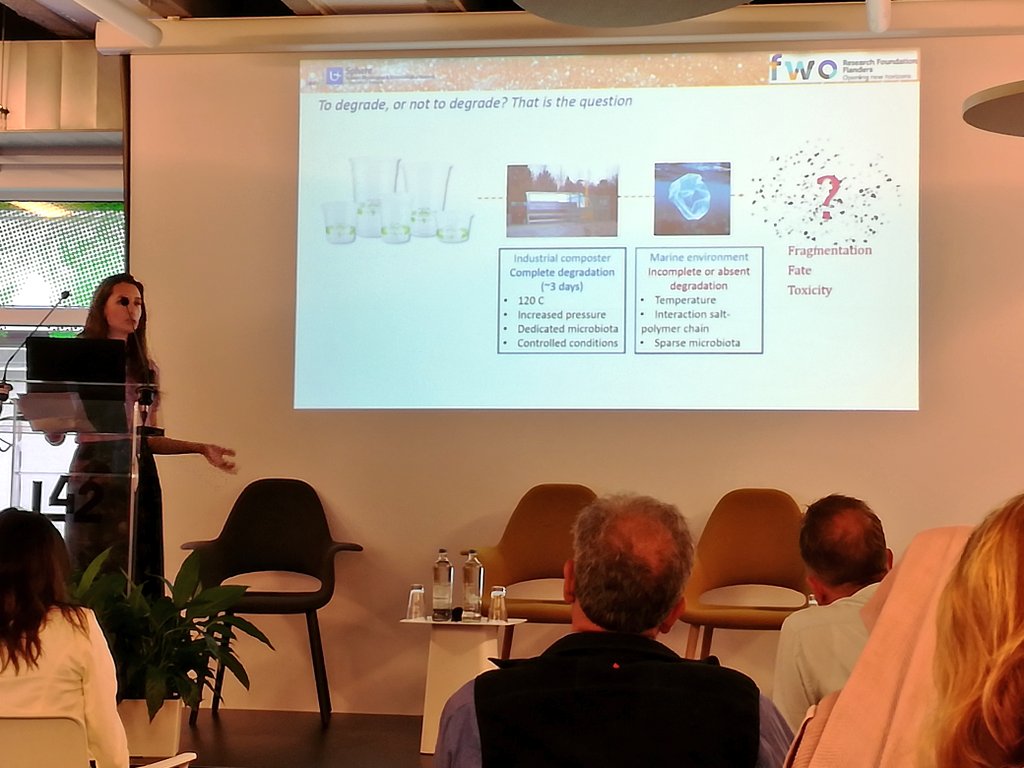
Public Talk: Calblanque Region Park...of Plastics?
EPHEMARE researcher at the Spanish Oceanographic Institute (Oceanographic Centre of Murcia) gave a talk about the problem of plastics in the area of the regional park on 30 June, 2018. After the presentation, a practical session was held at the beach consisting of the collection and the study of the plastics present in the sand of the beach.
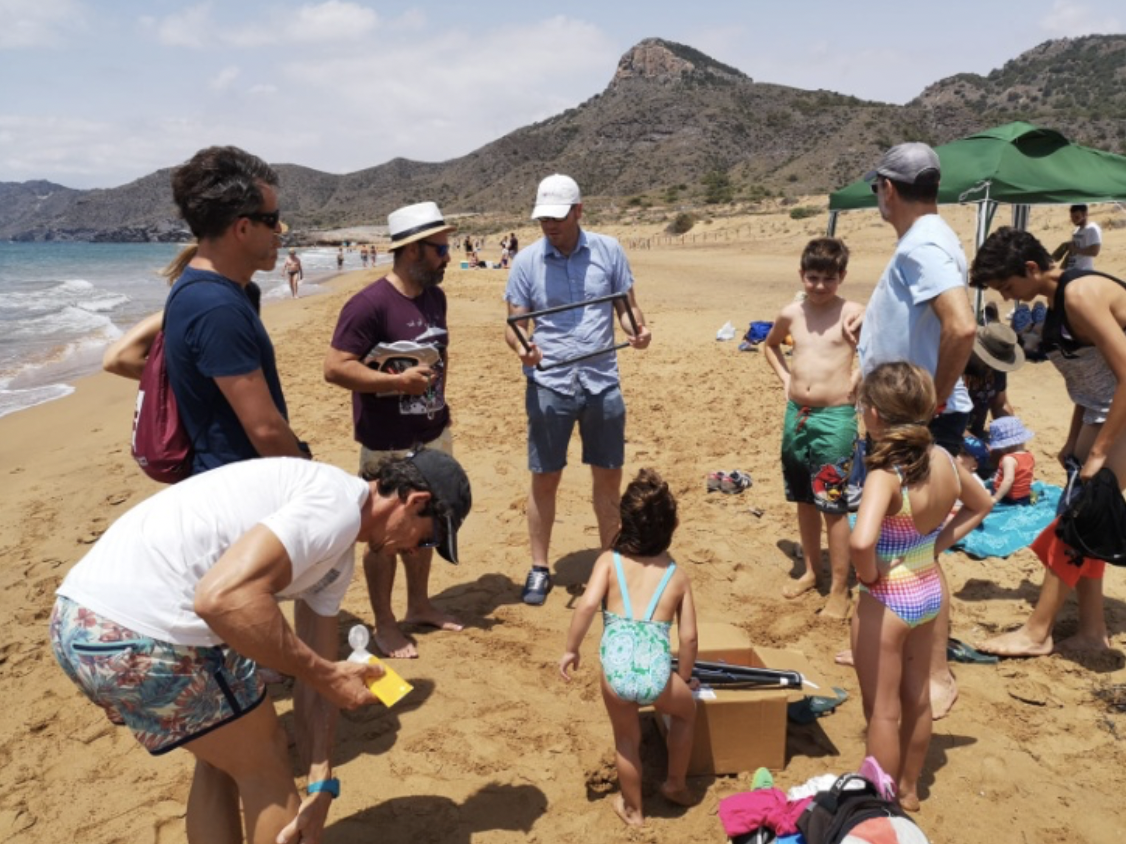
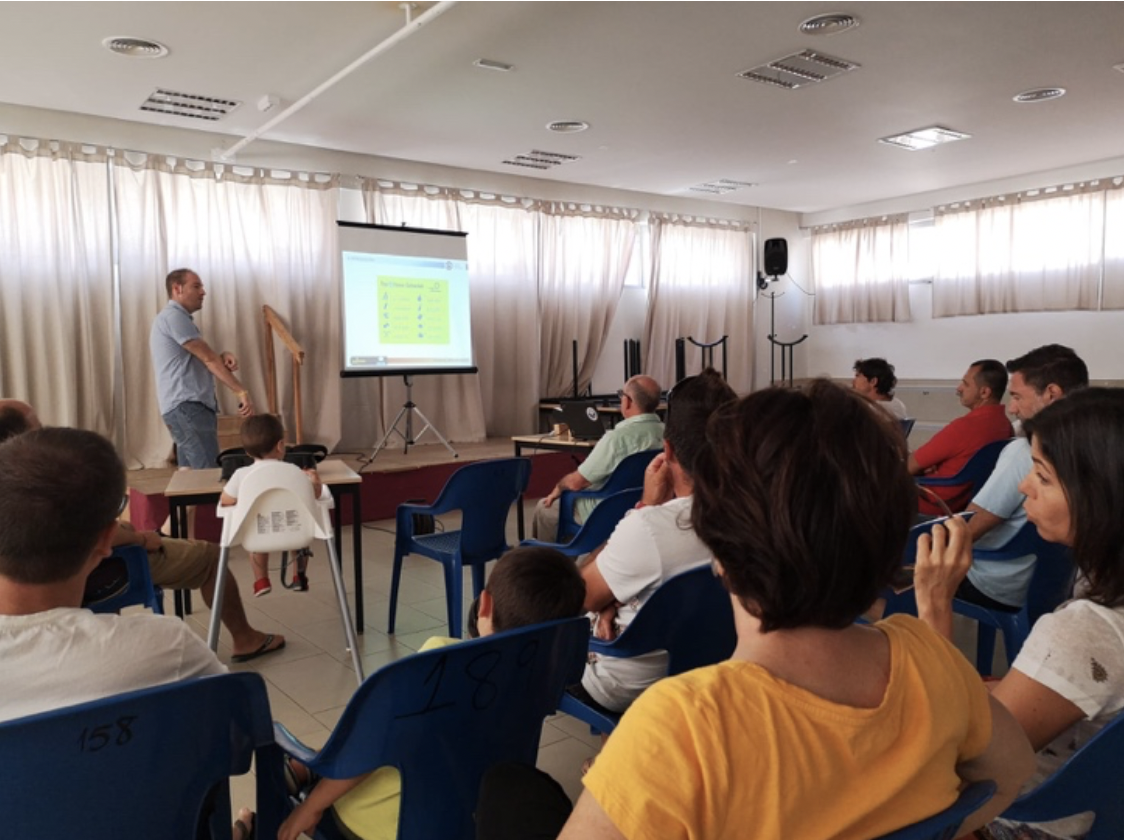
UNESCO World Oceans Day
UNESCO, the IOC, and the Surfrider Foundation organised a stellar event for World Oceans Day on 8 June. Over 200 students attended this conference on marine litter and microplastics. EPHEMARE representative Camilla Carteny gave a presentation to middle and high-schoolers demonstrating what microplastics are and how they can effect the marine environment. Read more here.
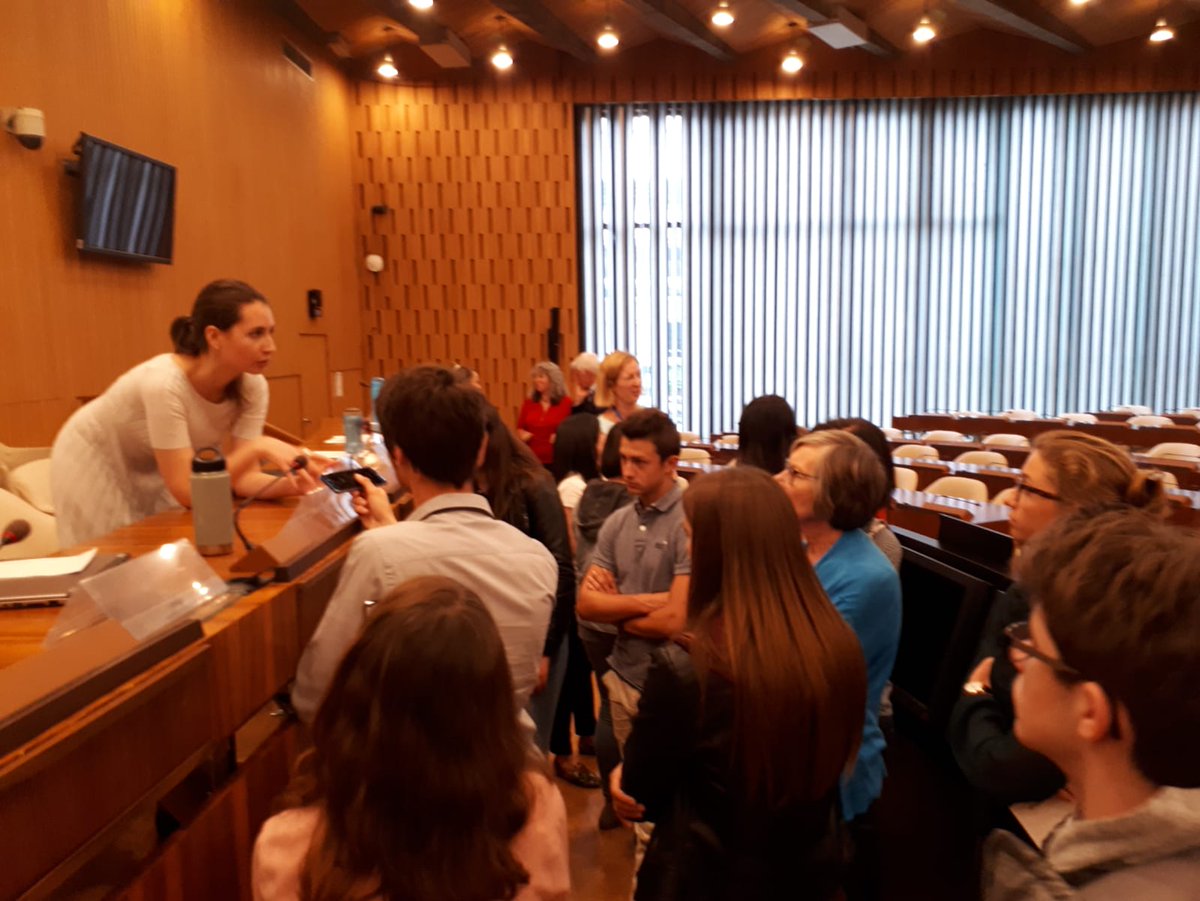
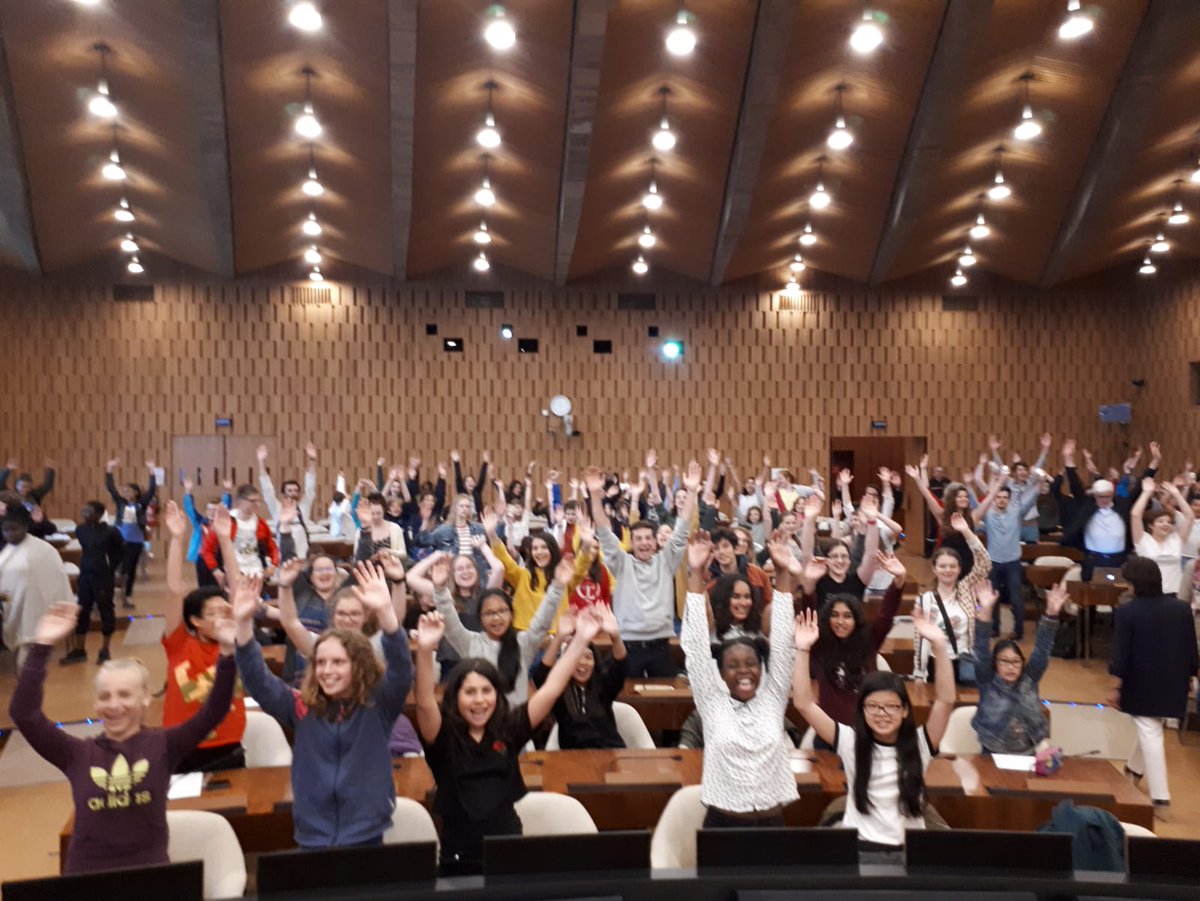
May 2018
Interdisciplinary Student Workshop on Microplastics and Medusae
After ECOBIM 2018, EPHEMARE researchers Jerome Cachot and Xavier Cousin joined artist Roman Kroke to host a student workshop titled "Microplastics and Medusae: expeditions into H2O." The workshop connected students with knowledge about plastic pollution and was a great success. Students were encouraged to take an active and creative role in the creation of experimental repurposed plastics. View some of the photos from the event below, or learn more about the workshop here (English) or here (français). You can also read more here (French language only).
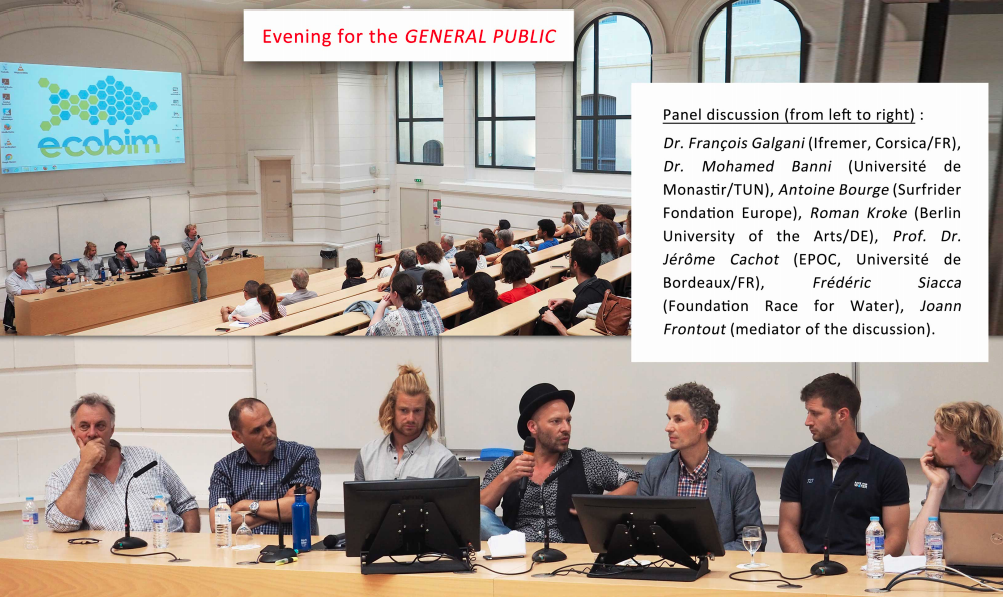
May Conferences and Presentations
EPHEMARE researchers had a busy month of conferences this month! View the latest conferences and presentations below.
Presentation at SETAC Europe's 28th Annual Meeting in Rome, "Responsible and Innovative Research for Environmental Quality":
Cormier Bettie, Larsson Maria, Yeung Leo, Clerandeau Christelle, Karrman Anna, Morin Benedicte, Engwall Magnus,Begout Marie-Laure, Cousin Xavier, Cachot Jerome, Keiter Steffen (2018). Sorption of model pollutants on microplastics and toxicity assessment using early life stage of zebrafish (Danio rerio) . SETAC Europe - 28th Annual Meeting "Responsible and Innovative Research for Environmental Quality”. 13–17 May 2018, Rome, Italy.
Posters and talks at ECOBIM 2018, "14ème colloque international francophone en écotoxicologie aquatique":
Cormier Bettie, Le Bihanic Florane, Keiter Steffen, Engwall Magnus, Larsson Maria, Yeung Leo, Clerandeau Christelle, Crebassa Jean-Claude, Morin Benedicte, Begout Marie-Laure, Cousin Xavier, Cachot Jerome (2018). EPHEMARE. Méthodologies pour étudier les effets toxiques des microplastiques sur les téléostéens. ECOBIM 2018 - 14ème colloque international francophone en écotoxicologie aquatique. 22 au 25 mai 2018, Talence, poster.
Le Bihanic Florane, Cormier Bettie, Misurale Francesco, Bringer Arno, Joassard Lucette, Keiter Steffen, Cachot Jerome,Begout Marie-Laure, Cousin Xavier (2018). Conséquences physiologiques de l'exposition de medaka marin à des microplastiques. ECOBIM 2018 - 14ème colloque international francophone en écotoxicologie aquatique. 22 au 25 mai 2018, Talence.
Le Bihanic Florane, Cormier Bettie, Clerandeau Christelle, Crebassa Jean-Claude, Morin Benedicte, Begout Marie-Laure, Cousin Xavier, Cachot Jerome (2018). Toxicité comparée des microplastiques pour les premiers stades de développement de deux poissons modèles le médaka marin (Oryzias Melastigma) et le poisson zèbre (Danio rerio). ECOBIM 2018 - 14ème colloque international francophone en écotoxicologie aquatique. 22 au 25 mai 2018, Talence.
April 2018
EPHEMARE Researchers have had a very busy month of outreach - including attending and presenting at many conferences and workshops, and engaging with the media. See below for an account of what the EPHEMARE team have been up to this April!
Murcia Regional Television
EPHEMARE researcher Marina Albentosa from the Spanish Institute of Oceanography featured on local TV channel TV7 on the programme 'Country Journal', on how plasics in the sea affect marine fauna. For Spanish speakers, you can see Marina in action here and by clicking below, from 07:35 to 15:00.
EuroMarine Foresight Workshop
EPHEMARE researchers Dr Ricardo Beiras (UVigo), Dr Lucia Guilhermino (CIIMAR) and Dr Francesco Regoli (Universidad de Murcia) were presenting at the EuroMarine Foresight Workshop: ‘Modelling Ocean Plastics Litter in a Changing Climate: Challenges and Mitigations’, providing a forum to discuss the issue of plastic pollution in the marine environment.
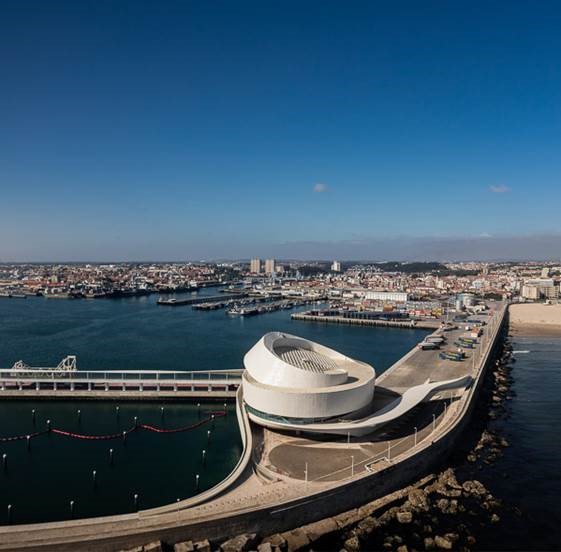
The location for the EuroMarine conference
- Dr Ricardo Beiras presented: Gaps of knowledge for the ecotoxicological assessment and modelling of microplastics in the sea: conclusions on the EPHEMARE project
- Dr Lucia Guilhermino: Effects of microplastics and interactions with other contaminants in a warming world: opportunities and challenges for modelling
- Dr Francesco Regoli: Levels and distribution of microplastics among Mediterranean marine species
The aim of the workshop was to provide a high profile event for a forum of debate regarding the issue of plastic pollution and to discuss both challenges and solutions being developed by scientists to help predict the effects of plastics in marine ecosystems.
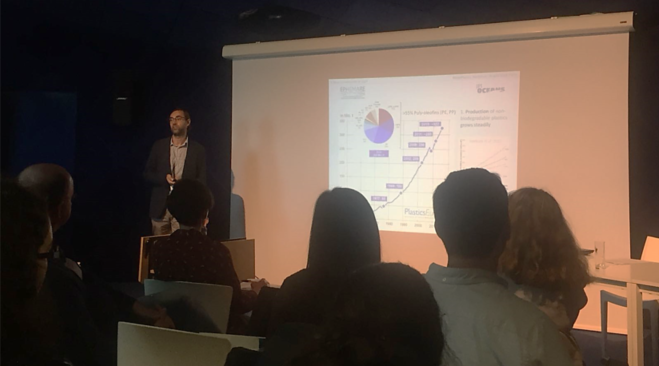
Dr. Ricardo Beiras presenting at the Euro Marine foresight workshop
PolyTalk 2018
Dr Marco Faimali, EPHEMARE researcher at CNR-ISMAR recently attended PolyTalk 2018 hosted in St. Julians, Malta. The conference, which acts as a forum for Plastics Europe to engage with stakeholders in dialogue to find ways of preventing marine litter around the world. Dr Faimali participated in a panel discussion in the session 'Improving resource efficiency and accelerating innovation to increase circularity - research and innovation'. He also had the change to engage with Mr. Karmenu Vella, the European Commissioner for Environment, Maritime Affairs and Fisheries, who outlined future European strategies to combat marine litter.
Panel featuring Marco Faimali (centre)
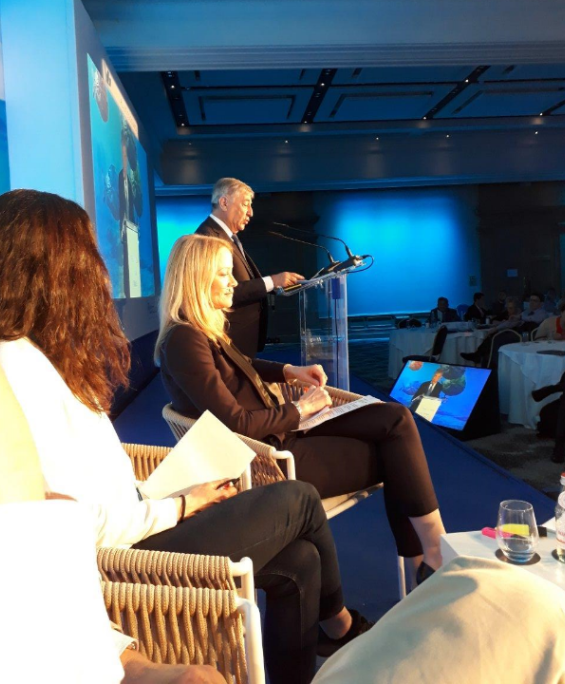
Mr Karmenu Vella, European Commisssioner for Environment, Maritime Affairs and Fisheries
SEARICA Mission Ocean Conference
EPHEMARE researchers Camilla Carteny (University of Antwerp), Marco Faimali (ISMAR), Kathrin Kopke and Sophie Power (University College Cork) attended the SEARICA conference Mission Ocean: Science and Innovation for a Healthy Ocean on the 10th of April 2018 at the European Parliament. The conference focused on discussing the issue of marine plastic pollution with international and cross-sectorial guests and coincided with the Ocean Plastics Lab visit to the European Parliament as part of its travelling exhibition.
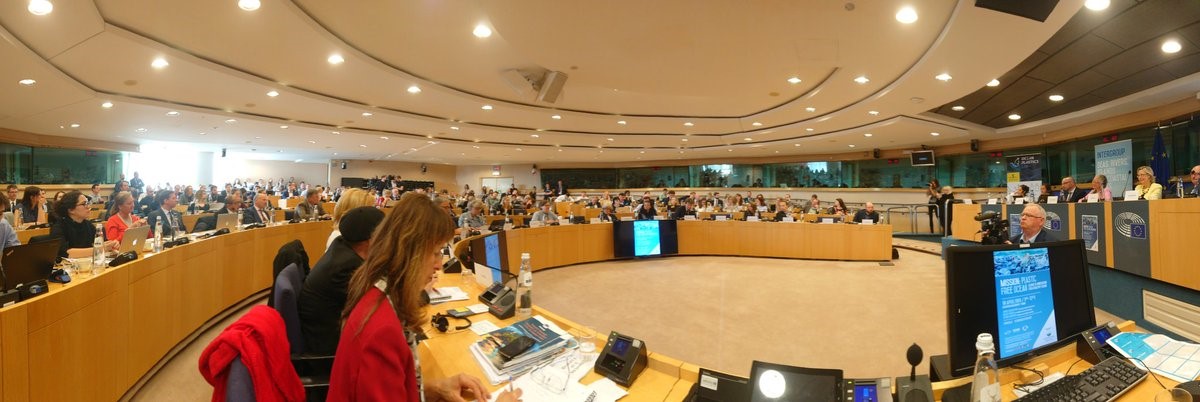
Full house at the European Parliament SEARICA conference Mission Ocean: Science and Innovation for a Healthy Ocean
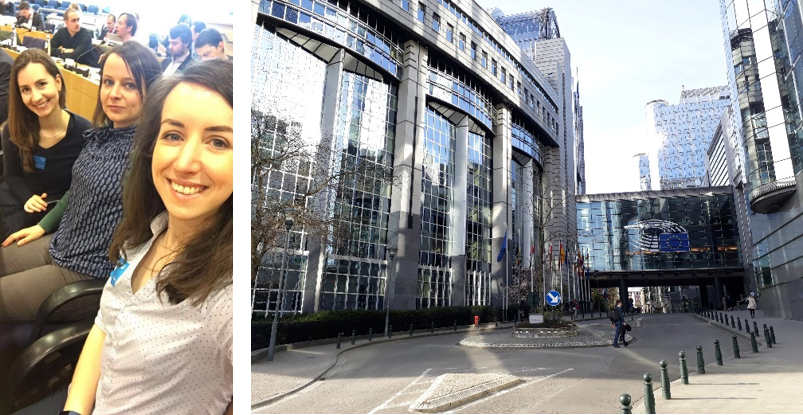
L-R Camilla C. Carteny (University of Antwerp), Kathrin Kopke (MaREI, University College Cork) and Sophie Power (MaREI, University College Cork) at the European Parliament event

L-R: Olga Mironenko, founder of the award-winning start-up Holy Jelly; young Indonesian activist, Melati Wijsen, co-founder of Bye Bye Plastic Bags; James Honeyborne, award winning producer of the world renowned BBC Blue Planet 2 series; Gesine Meissner, German MEP and president of Searica; Signe Rasso, Deputy-General DG Research and Innovation; Michael Meister, Parliamentary State Secretary at the German Federal Ministry of Education and Research
The Ocean Plastics Lab
The Ocean Plastics Lab (OPL) (http://oceanplasticslab.net/) exhibited in from of the European Parliament in Brussels from the 9th to the 19th of April 2018. The exhibition is a ‘hands-on’ lab, showcasing the contribution of science to understand and combat the problem of plastics in the ocean, with interactive installations, displays and animations on loan from laboratories, research institutes and various other science and civil society partners worldwide. EPHEMARE is delighted to contribute with selected images from IMPACT2017 the projects International microplastics photo contest. EPHEMARE researchers had not only the chance to visit and explore the exhibition in Brussels, but directly engage with visitors at Container 3, which exhibits the EPHEMARE contributions. EPHEMARE’s Camilla C. Carteny, University of Antwerp was interviewed by Belgian newscast (RTL) explaining the science of the OPL exhibitions which exhibited the pictures from the EPHEMARE organised contest.
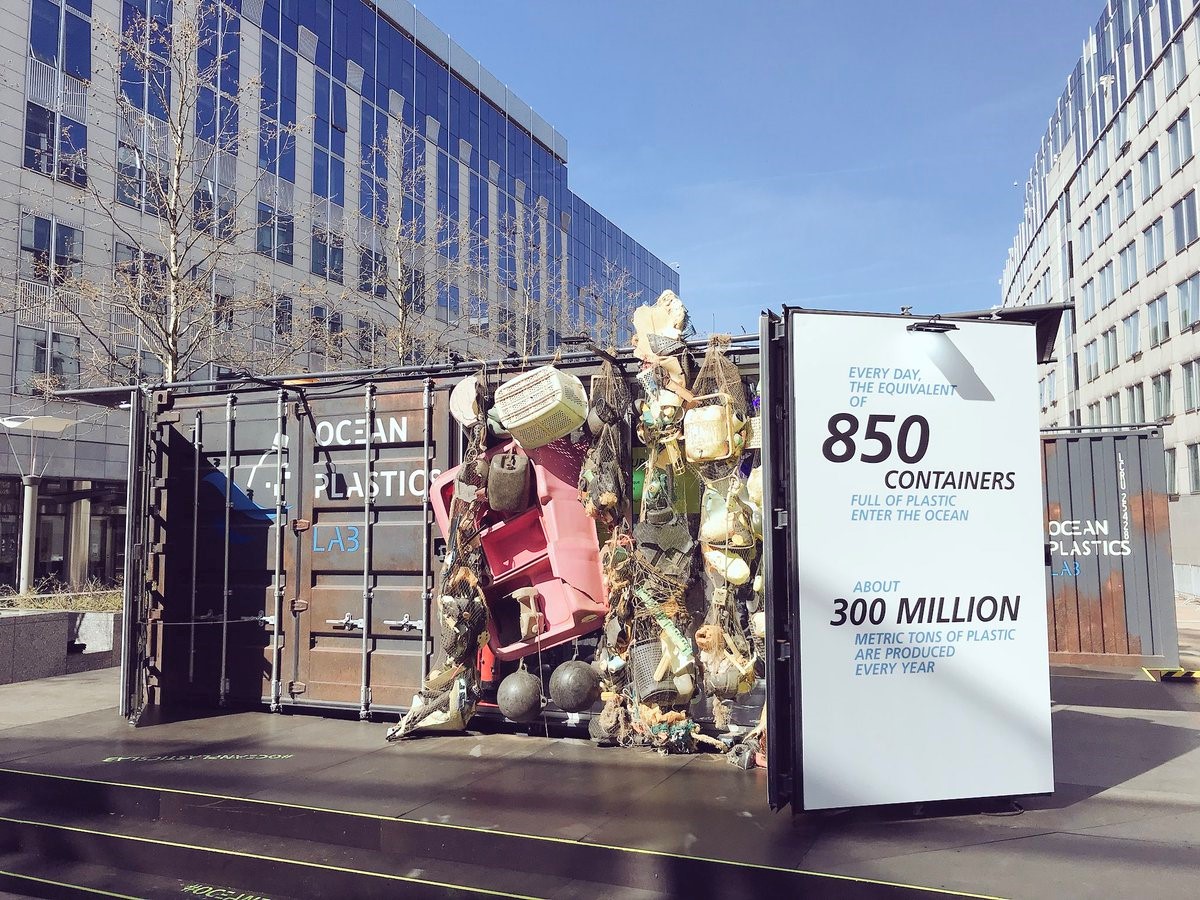
The Ocean Plastics Lab outside the European Parliament Buildings

Clockwise from top left: Sophie Power (University College Cork), Kathrin Kopke (University College Cork) and Camilla C. Carteny (University of Antwerp) at the Ocean Plastics Lab; Kathrin Kopke presenting the EPHEMARE IMPACT 2017 photo competition entries at Container 3; Marco Faimali (ISMAR) with the IMPACT 2017 images; Media presence at the Ocean Plastics Lab
Plastic Pollution in Our Ocean
EPHEMARE researchers from University of Antwerp were invited as speakers and panellists at the consecutive ‘Plastic Pollution in our Oceans’ series of talks at the Brussels Royal Museum for Natural Sciences. The three talks were delivered in English, French and Dutch, with researchers Camilla Carteny and Professor Ronny Blust (both University of Antwerp) representing the EPHEMARE project and their research to the public. Presentations from the events are foreseen to be made available online from the JPI Oceans’ platform (http://www.jpi-oceans.eu/news-events/news/plastic-pollution-our-ocean-%E2%80%93-tackling-mammoth-task-public-debate).
Plastic Pollution of Our Ocean - What is the problem and what can we do about it?
Public lecture organised by OPL and JPI Oceans at the Royal Museum for Natural Sciences 11/04/2018
A public lecture on plastic pollution was given; the panellists were:
- Dr Patrick Roose, from the Royal Belgian Institute for Natural Sciences
- Dr Carl Van Colen, from PLASTOX, Ghent University, who presented a scientific take on where does marine litter come from, levels, fate, and a brief introduction over the role of his project
- Camilla C. Carteny, from EPHEMARE, University of Antwerp, who gave a presentation over the effects of marine plastic litter on marine ecosystems, encompassing macro-, micro-, and nanolitter
- Dr Samantha Burgess, head of EU Marine Policy at WWF Europe, who spoke about the initiatives of ONGs to educate and change behaviour, and suggested ways for the general public to engage in the plastic-free movement
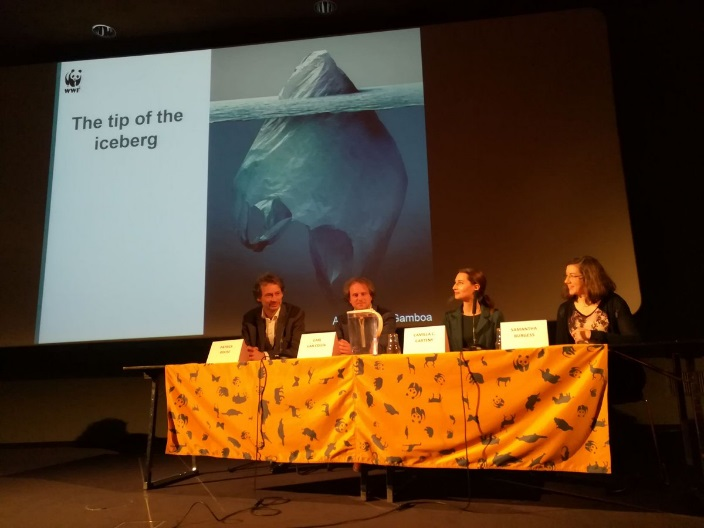
Pannelists from left to right; Dr Patrick Roose, from the Royal Belgian Institute for Natural Sciences; Dr Carl Van Colen, from PLASTOX, Ghent University; Camilla C. Carteny, from EPHEMARE, University of Antwerp and Dr Samantha Burgess, head of EU Marine Policy at WWF Europe.
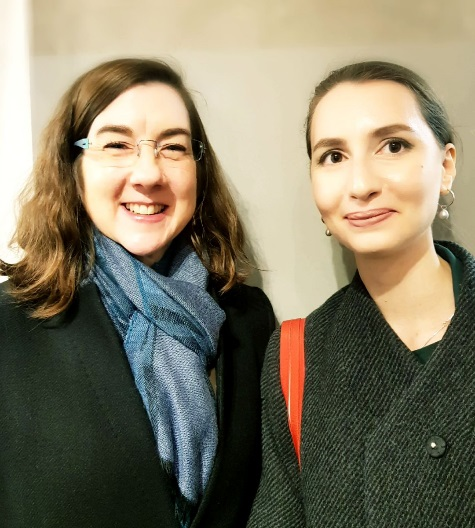
Dr Samantha Burgess, head of EU Marine Policy at WWF Europe and EPHEMARE’s Camilla C. Carteny University of Antwerp
Plastic in de Oceaan – Wat is het problem en wat kunnen we doen?
Public lecture in Dutch organised by OPL and JPI Oceans at the Royal Museum for Natural Sciences 17/04/2018
A public lecture on plastic pollution was given in Dutch; the panellists were:
- Kelle Moreau, from the Royal Belgian Institute for Natural Sciences
- Ronny Blust, from EPHEMARE, University of Antwerp
- Aäron Fabrice, from the Proper Strand Lopers initiative
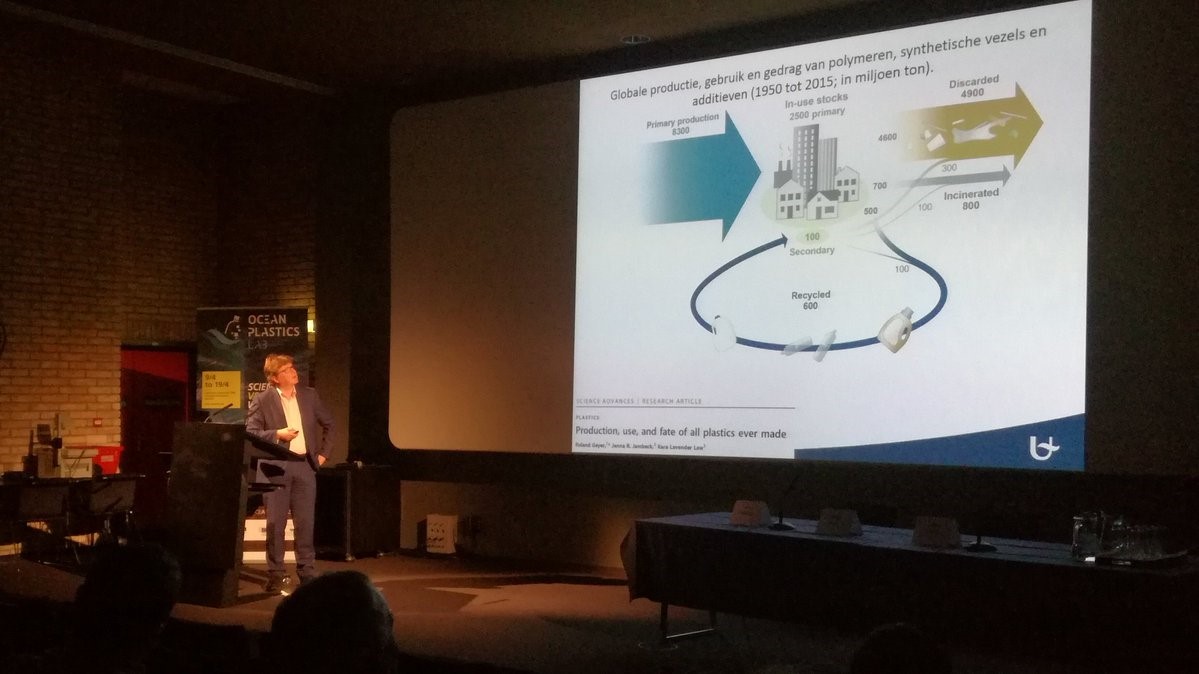
EPHEMARE’s Prof. Ronny, Antwerp University presenting in Dutch and highlighting that out of the 8,300m tonnes of plastic produced between 1950-2015, less than 600m have been recycled, which is less than 8%
Plastique dans l’océan – Quel es le problème et que pouvons-nous faire?
Public lecture in French organised by OPL and JPI Oceans at the Royal Museum for Natural Sciences 18/04/2018
A public lecture on plastic pollution was given in French; the panellists were:
- Serge Scory, from the Royal Belgian Institute for Natural Sciences
- Camilla C. Carteny, from EPHEMARE, University of Antwerp, who gave a presentation over the presence, fate, and effects of marine plastic litter in marine ecosystems, encompassing macro-, micro-, and nanolitter
- Justine Maillot, EU Policy officer at Surfrider Foundation Europe, who introduced the different initiatives of her organisation to raise awareness and act in the French-speaking communities.
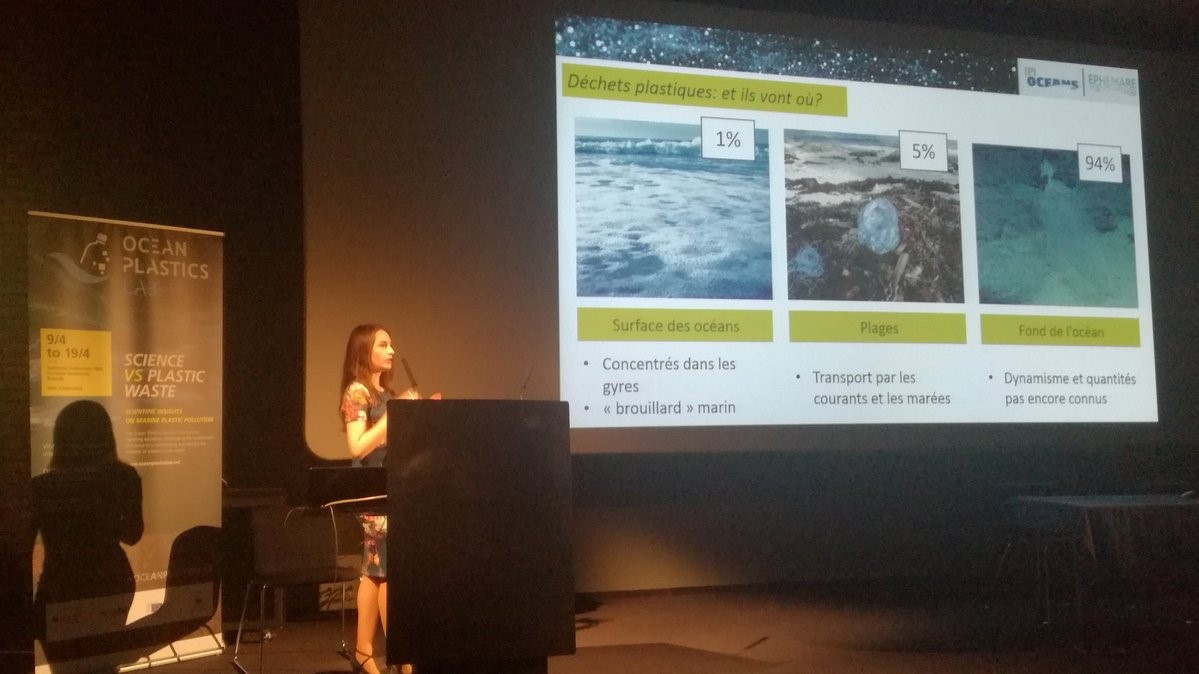
EPHEMARE’s Camilla C. Carteny, University of Antwerp presenting in French to the public focusing on presence, fate, and effects of marine plastic litter in marine ecosystems
After the presentations, there was a lively discussion with the audience; in this instance the public seemed particularly interested in policy, from what citizens can do to influence their representatives, to lobbying from plastic companies, through EU policy and member state implementation. Another problem discussed was the possibility of getting tap water in public venues rather than bottled water – which polarised the audience on whether it is due to regulation or to the behaviour of the owners.
March 2018
EPHEMARE partners at UPM attended the annual academic inauguration 2018/2019 at Polytechnic University Ancona on 26 March. The discussion was framed around the topic "Pericoli emergenti e pericoli emersi… nuove minacce per la salute del mare." View the talk below!
February 2018
EPHEMARE Stakeholder Workshop
Stakeholder Workshop
On February 21st, the EPHEMARE Stakeholder Workshop was held in the University of Antwerp, inviting stakeholders from research, regulators, policy makers and industry representatives. The workshop was designed in order to facilitate effective knowledge exchange between stakeholders, and working towards identifying future research areas and potential solutions to the negative impacts of microplastics in the marine environment based on mutual understanding.
The workshop opened with a series of presentations from experts in the fields of microplastics research and policy, to set the scene and context for the current standing of microplastics in these areas, including a summary of the EPHEMARE project, marine litter and microplastics monitoring, microplastics research, an overview of the Plastics Strategy, and REACH Restrictions on Microplastics intentionally added in products.
The afternoon group work consisted of a short icebreaker, followed by discussions in teams on the identification of future research areas and designing a potential solution to the issue of microplastics in marine environments. The participants then had the opportunity to vote for their favourite solution under 2 categories: most implementable and most effective.
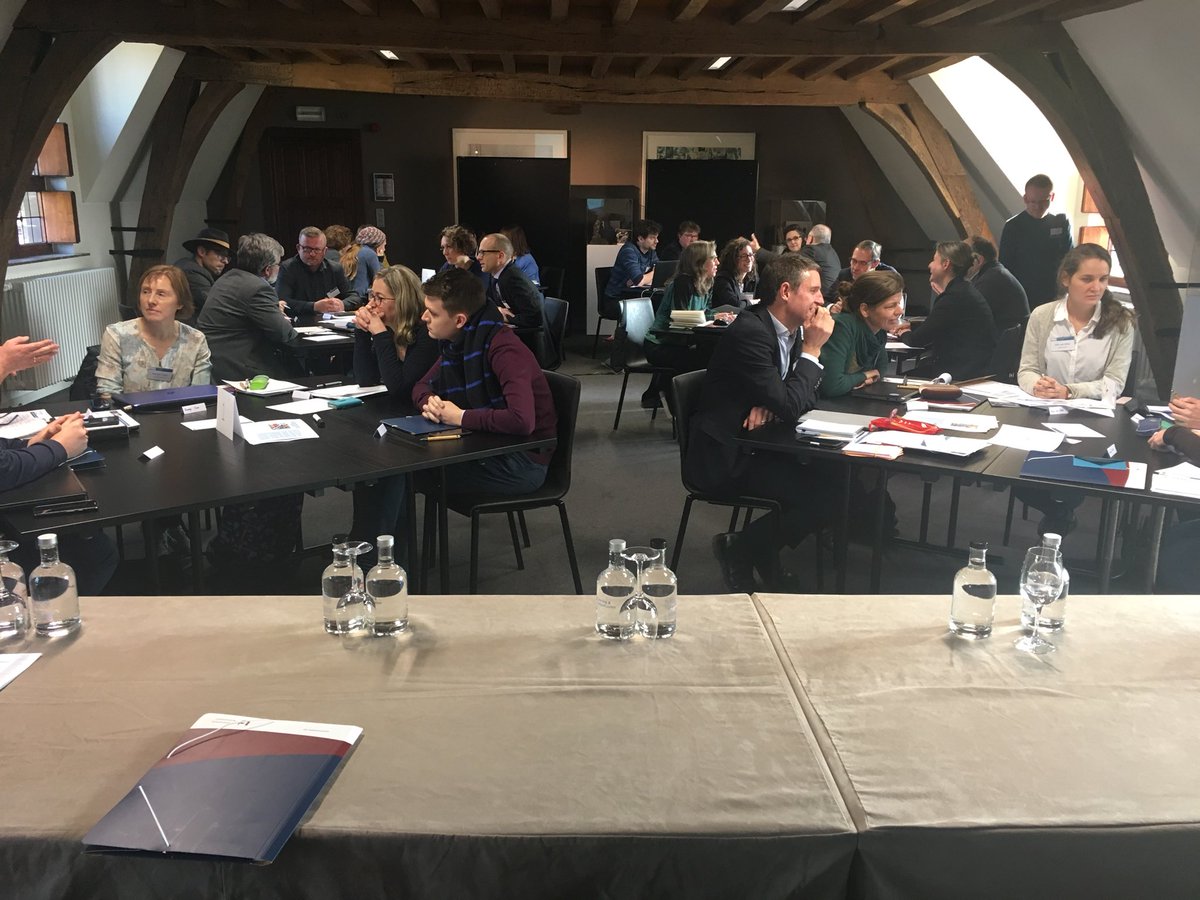
The day concluded with an expert led panel discussion, comprising of Prof Dr Thomas Braunbeck(Aquatic Ecology and Toxicology, Centre for Organismic Studies, University of Heidelberg), Richard Cronin (Vice-Chairman OSPAR Commission, Senior Advisor Water Division Department of Housing, Planning, Community and Local Government, Ireland), Didier Bourguignon (Policy Analyst, European Parliament DG Parliamentary Research Services ), GertVerret(Policy Officer, Flanders Department of Economy, Science and Innovation, JPI Oceans Management Board), and Valentina Berato (Policy Officer, Sustainable Chemicals, EU Commission, DG Environment), with closing remarks from Proffessor Ronny Blust, vice rector science at the University of Antwerp.
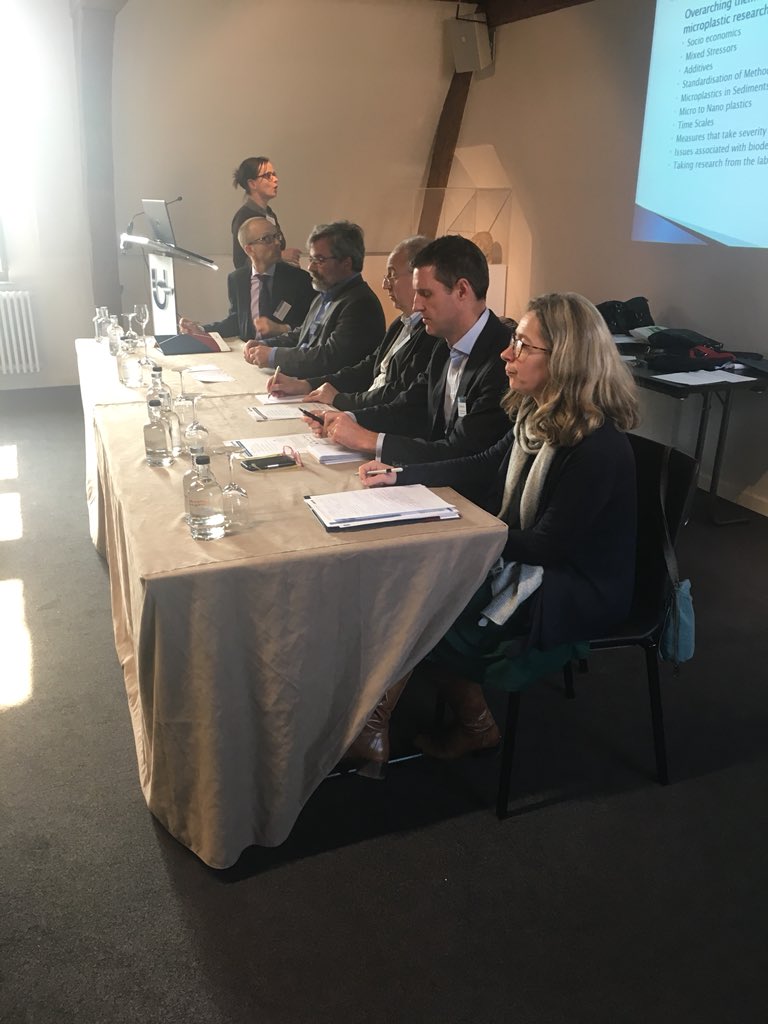
Thank you to all contributors to and participants in our workshop for making it such a success!
January 2018
EPHEMARE researchers gave two presentations this month on microplastic toxicity at PO2018: Polymères & Océans 2018 "Vers une vision pluridisciplinaire de la dégradation des plastiques". The conference took place in Montpellier over 14-17 January.
The first discussed microplastic toxicity on early stage development in a model fish: the medaka (Oryzias latipes):
Le Bihanic Florane, Clerandeau Christelle, Cormier Bettie, Morin Benedicte, Crebassa Jean-Claude, Begout Marie-Laure, Cousin Xavier, Cachot Jerome (2018). Toxicité des microplastiques pour les premiers stades de développement d'un poisson modèle, le médaka marin. PO2018 - Polymères & Océans 2018 "Vers une vision pluridisciplinaire de la dégradation des plastiques". 14-17 janvier 2018, Montpellier
The second: Cormier Bettie, Larsson Maria, Yeung Leo, Clerandeau Christelle, Karrman Anna, Morin Benedicte, Engwall Magnus, Begout Marie-Laure, Cousin Xavier, Keiter Steffen, Cachot Jerome (2018). Toxic effects of industrial primary microplastics, spiked with model pollutants, using zebrafish (Danio rerio) . PO2018 - Polymères & Océans 2018 "Vers une vision pluridisciplinaire de la dégradation des plastiques". 14-17 janvier 2018, Montpellier.
New EPHEMARE Publications
EPHEMARE researchers have a number of publications coming out in Environmental Pollution resulting from work conducted over the course of the project.
Researchers from the University of Murcia have two articles coming under review in early 2018.
The first, available online now (click here for more): Espinosa, C., García Beltrán, J.M., Estaban, M.A., Cuesta, A. 2018 'In vitro effects of virgin microplastics on fish-head kidney leucocyte activities' in Environmental Pollution, 235, pp. 30-38. The full article is available here: https://www.sciencedirect.com/science/article/pii/S0269749117331317
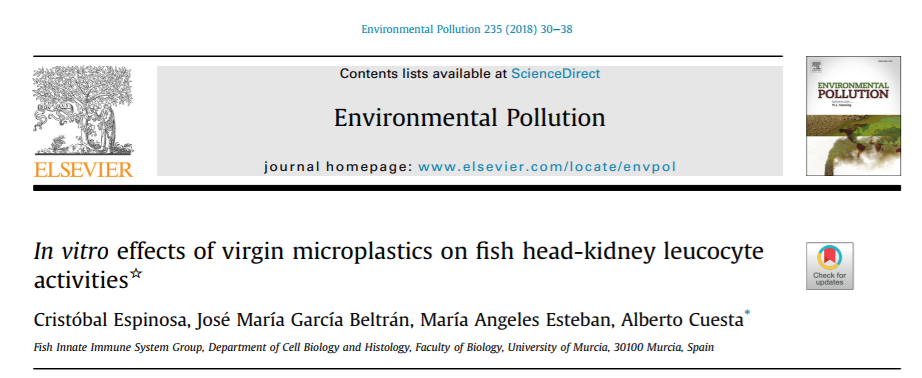
EPHEMARE Project members at the University of Heidelberg have also recently published a paper in the same journal relating to accumulation patterns and transfer of benzo[a]pyrene to zebrafish fills and zebrafish embryos.
Batel, A., Borchert, F., Reinwald. H., Erdinger, L. and Braunbeck, T. 2018 ‘Microplastic accumulation patters and transfer of benzo[a]pyrene to adult zebrafish (Danis rerio) gills and zebrafish embryos’ in Environmental Pollution, 235, pp. 918-930, with full details on the publication available at https://www.sciencedirect.com/science/article/pii/S0269749117336801
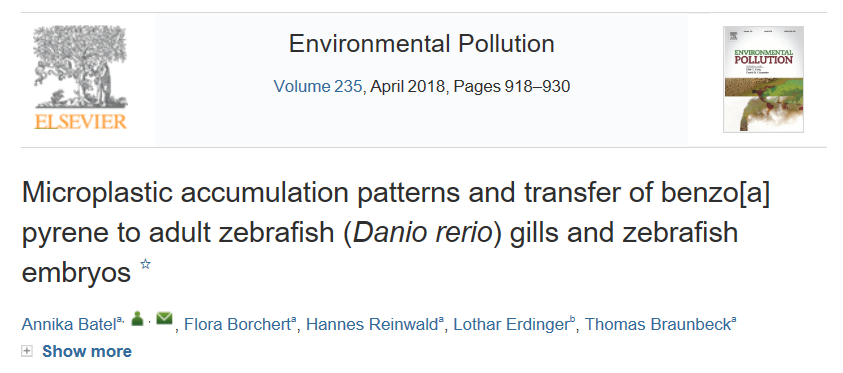
Meanwhile, researchers in the University of Oslo and at Örebro University also have succeeded in having a paper published in Environmental Pollution: Bour, A., Haarr, A., Keiter, S. and Hylland, K. 2018 ‘Environmentally relevant microplastic exposure affects sediment-dwelling bivalves’ in Environmental Pollution, 236, pp. 652-660. Click here for more https://www.ncbi.nlm.nih.gov/pubmed/29433106?otool=bibsys
EPHEMARE in the News!
EPHEMARE recently featured in an article in the regional newspaper La Verdad, published on January 23, 2018. EPHEMARE scientists Juan Santos-Echeandía and Juan A. Campillo spoke about metal pollution in the Mediterranean, while Marina Albentosa comments on the studies that are being carried out under the EPHEMARE project on the role of microplastics as heavy metal transporters.


News and Events 2017
- December 2017
EPHEMARE Newsletter 2017
As we come to the end of 2017, we recap on what our researchers have been up to. It's been a busy 2017 for the EPHEMARE project, click here to find out more! Keep up to date on the latest progress and announcements from EPHEMARE by following us on Facebook and Twitter! 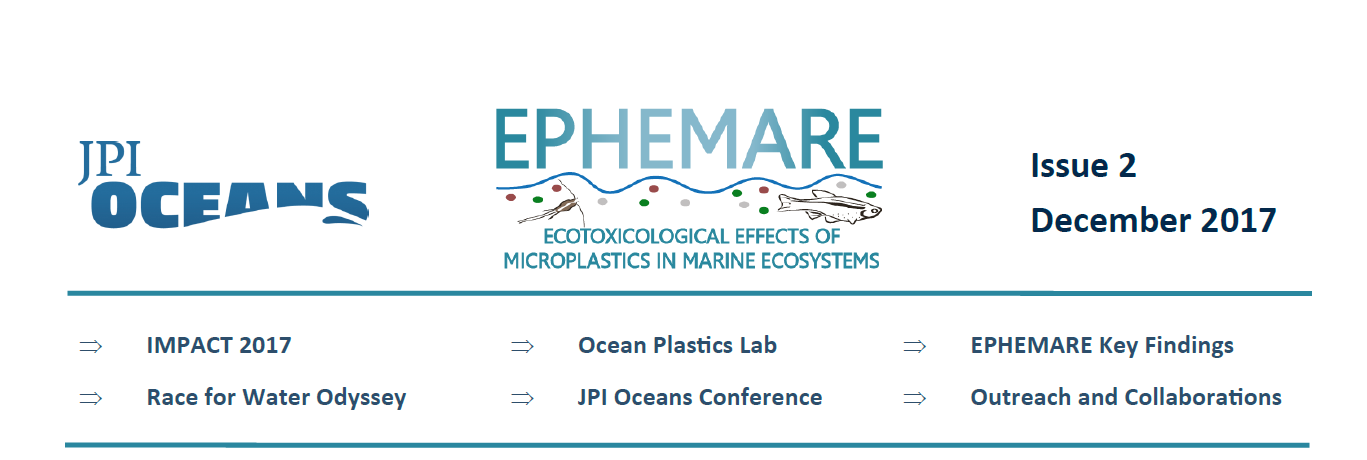
EPHEMARE teaming up with Race for Water (R4W) – the numbers are in:
This Race for Water Odyssey focused on three pillars: Learn, Share and Act. EPHEMARE scientists were delighted to use the opportunity of the R4W to undertake sampling in Bermuda and Guadeloupe and to raise awareness of their research through fantastic media coverage, a conference, a workshop and welcoming school children on board. For more information check out the R4W website: http://www.raceforwater.com/home and if you want to know what the EPHEMARE scientists got up to, reread the R4W blog entries for Bermuda and Guadeloupe.
EPHEMARE’s Dr. Bénédicte Morin, on the R4W: "Quite frankly, I’m delighted and I’m sure my colleagues are too. The vessel is incredibly spacious and we can carry out some high-quality work on her, added to which the teams aboard the boat have given us a very warm welcome. It’s just extraordinary to be able to carry out oceanic studies without any environmental impact and noise-free thanks to this vessel being propelled by clean energies."

- November 2017
EPHEMARE at H2020 SC2 Information Week
EPHEMARE Project Coordinator Ricardo Beiras presented the key findings to-date from the project as part of the H2020 Societal Challenge 2 information week in Brussels on November 17th. His presentation formed part of the Blue Growth Research and Innovation Day, and was presented at the sub-session addressing Marine Stressors and Food Security.

Cork Science Festival/Science Week Ireland 2017
Some of the entries of the EPHEMARE IMPACT 2017 International Microplastics Photo Competition were recently displayed as part of the Science of Sustainability event during Ireland’s National Science Week/Cork Science Festival, in St. Peters Church, Cork.
This event is part of a series of events, exhibitions, and talks taking place nationwide to celebrate science in Ireland, and highlight the variety of research being undertaken. The issue of marine litter and in particular microplastics in the marine environment is being highlighted through the exhibitions of these images.

Ocean Plastics Lab in Paris
The Ocean Plastics Lab began the second stage of its journey, this time in Paris, which included a visit from Nobel Peace Laureate Professor Muhammad Yunus! This exhibition is a ‘hands-on’ lab, showcasing the contribution of science to understand and combat the problem of plastics in the ocean. The exhibits encompass interactive installations, displays and animations on loan from laboratories, research institutes and various other science and civil society partners worldwide. EPHEMARE is delighted to contribute with selected images from #IMPACT2017 the projects International #microplastics photo contest, which took place in the Spring of 2017. The OPL will be in Paris until November 17th
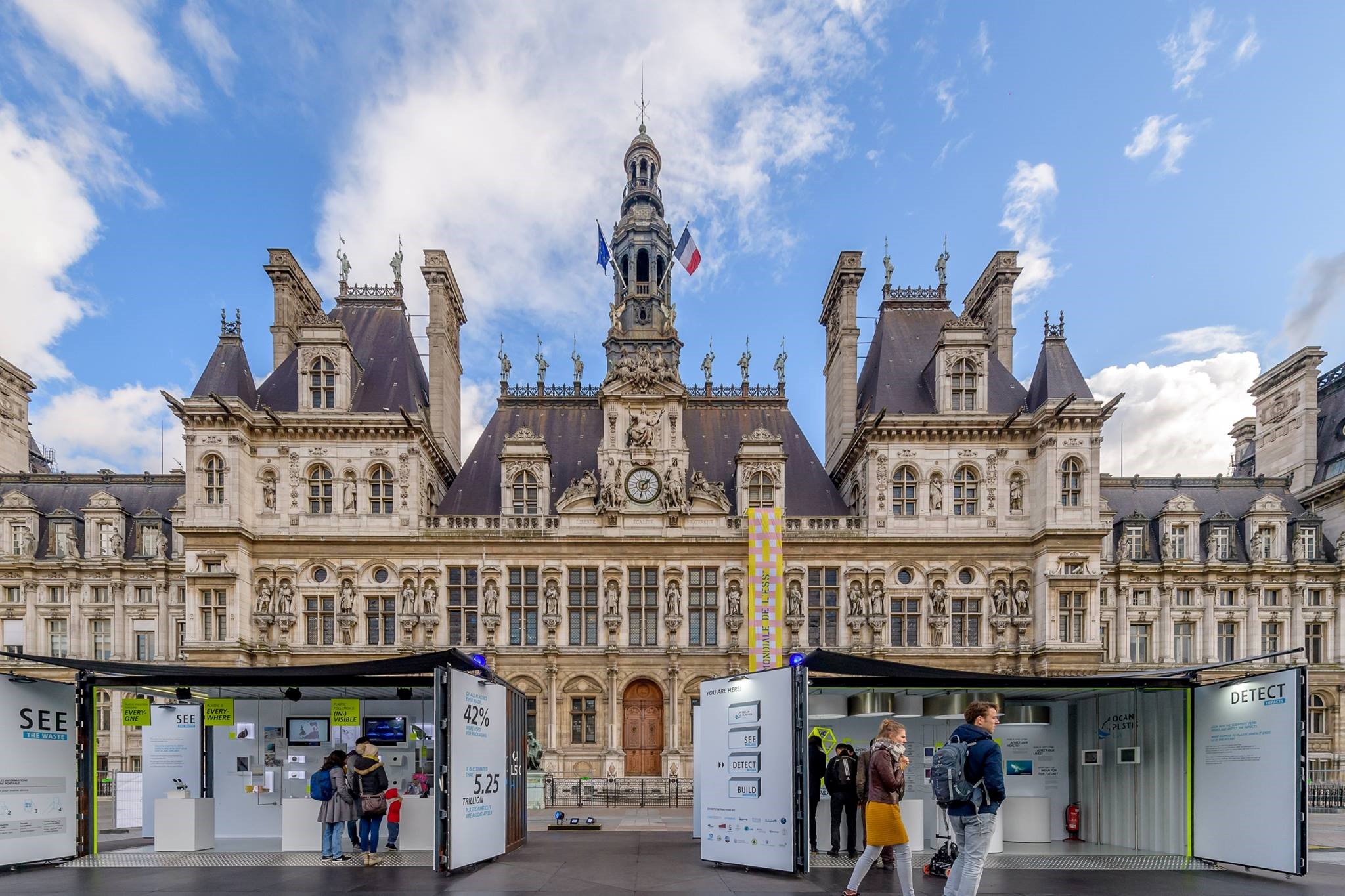
- October 2017
EPHEMARE scientists from the University of Bordeaux, the Polytechnic University of Marche, and the Institute of Marine Sciences of CNR arrived in Guadeloupe on October 4th to once again join the Race for Water. Taking part in the Race for Water (R4W) Odyssey allows EPHEMARE scientists to conduct sampling activities to characterise the presence and distribution of microplastics in this part of the ocean for the first time.
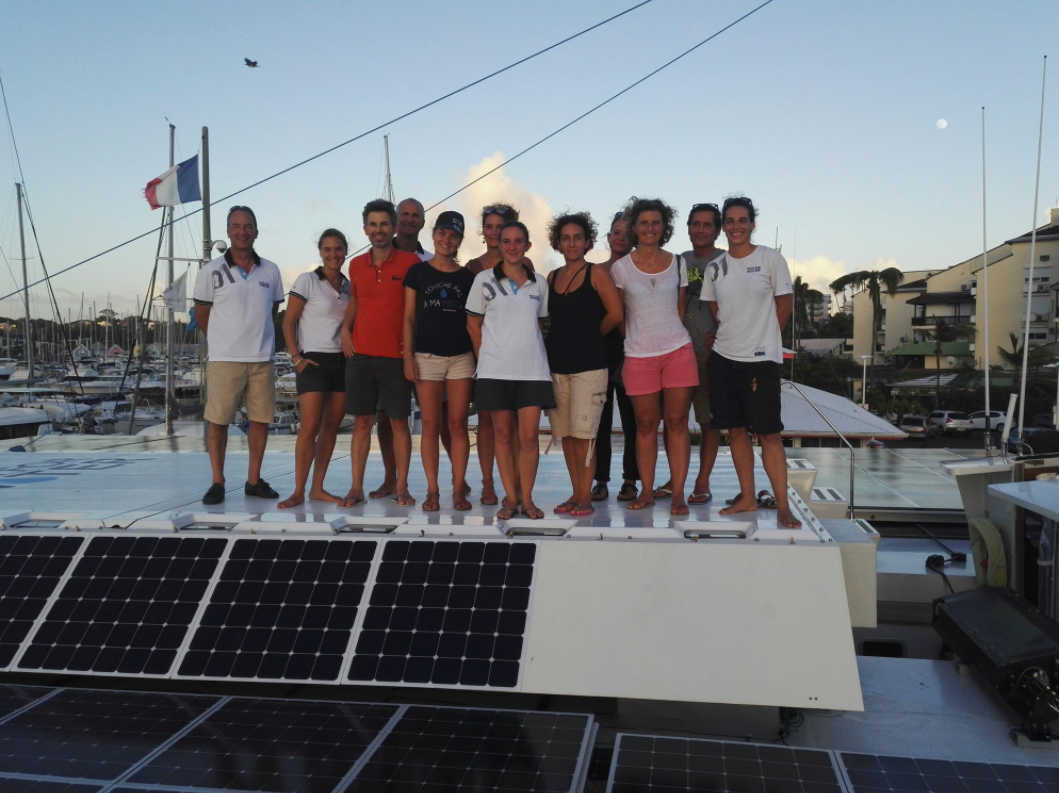
Sampling began on October 4th. The team first contacted local fishermen at the Point-a-Pitre market, and acquired samples of the main species caught and consumed locally.
Sampling was also carried out on the local beaches of the Petit Bourg, one of the most polluted areas in Guadeloupe, significantly due to the past use of pesticides in local banana plantations, which has resulted in the interdiction of fishing for the next number of decades in the area. Additional sampling was conducted around the Petit Bourg Marina, where many specimens of tube worms and oysters were collected.
Post-sampling, the organisms collected are dissected in the wet backs on the T4W, in line with EPHEMARE protocols. Further lab analysis of samples will be carried out back in the EPHEMARE labs in Europe upon the return of the researchers
Sampling work continued on October 5th, with the team dividing responsibilities. One group remained on board the R4W sampling for microplastics within the seawater column and marine sediments with the use of a Manta net.
The second group were working on sampling marine species. By deploying nets and snorkelling, scientists were able to acquire a variety of specimens, including oysters, crabs, new species of fish, sea urchins, gastropods and other invertebrates.
Following two days spent on the main island of Guadeloupe, the R4W headed south to Marie-Galante. The team chose a beach located in the town of Capersterre towards the south of the island to sample, facing the prevailing winds and currents. The team from the University of Bordeaux took care of beach sand sampling while the Italian researchers worked to obtain a wide variety of fish from the market at Grand Bourg, and collected in situ marine invertebrates from Capesterre. Sediments were recovered with a van Veen bucket from a Zodiac and three Manta net trawls at 300 μm and three plankton net trawls at 50 μm were used to sample microplastics and zooplankton from the water surface.
- September 2017
EPHEMARE Team Joining the 'Race for Water'
The EPHEMARE scientists are currently preparing to join the next leg of the ‘Race for Water’ Odyssey in Guadeloupe. In the meantime, the Race for Water team have facilitated a visit to the research vessel for local schoolchildren, talking to the scientists of tomorrow. The students visited the vessel to talk about the problems of plastics in the marine environment and the preservation of our oceans.
05/10/2017 Update: The EPHEMARE team have arrived in Guadaloupe, ready to take part in the next stage of their round-the-world Odyssey! Keep an eye on our social media (Facebook and Twitter) for updates on how the team is progressing!

EPHEMARE at Ocean Plastics Lab
The Ocean Plastics Lab has hit the road, opening in Turin on September 28th, World Maritime Day.
EPHEMARE contributed some of the entries from the IMPACT 2017 photo competition to Ocean Plastics Lab, to be displayed in order to raise awareness of microplastics and to highlight JPI Oceans research in the subject area.
The exhibition is designed as a hands-on science lab, inviting visitors to assume the role of scientists and over the course of four consecutive containers explore the extent and impact of plastics in the ocean. The exhibits in OPL encompass interactive installations, displays and animations on loan from laboratories, research institutes and various other science and civil society partners worldwide. The Ocean Plastics Lab has been initiated by the German Federal Ministry of Education and Research together with the German Marine Research Consortium and international partners from policy and science.
The exhibition has gained much attention, with the European Commissioner for Research and Innovation Carlos Moedas and the German Federal Minister of Education and Research Johanna Wanka attending the opening session and viewing the EPHEMARE IMPACT 2017 entries.
The exhibition will remain in Turin until the 7th of October, from where it will move to Paris from November 4th to 17th.

EPHEMARE in Santa Marta, Columbia
EPHEMARE featured at the the Ocean Teacher Global Academy (OTGA) course: Ocean Literacy and Story Telling Maps Training Course in Santa Marta, Columbia at Invemar, as an example how Ocean Literacy can be advanced on specific topics such as microplastics in our oceans. The course coordinated by IOC-UNESCO held back to back with the 8th International Coastal Atlas Network (ICAN) workshop on “Coastal Web Atlases enhancing Ocean Literacy (OL) and both events attracted more than 25 participants from 20 countries in the week from the 11th till 15th of September 12, 2017. For more information visit the ICAN website and check out the OTGA course agenda.

- June/July 2017
EPHEMARE scientists on board the MS Wissenschaft in Germany
EPHEMARE scientists from the University of Heidelberg, were invited to talk about microplastics on board the MS Wissenschaft on Sunday the 16th of July, 2017. This swimming science center promotes marine science and targets specific topics that are of concern in marine science. The EPHEMARE team in Heidelberg used the opportunity to not only inform about microplastics in general but highlighting through research methods where microplastics can be found e.g. in sediment samples, especially targeting the younger audience members age 8-12 years old. The team also used Artemia (brine shrimp) that had ingested microplastics, and demonstrated a Sodium chloride (NaCl) sediment extraction. This microplastic event reached about 30 to 40 people and is part of the larger 2017 tour of the “MS Wissenschaft”, which started on April 24th and will finish on the 8th of October in Straubing in Southern Germany. The exhibition ship “MS Wissenschaft” is on tour several months per year since 2002 and presents science in new ways and hosts about 80.000 visitors per year. For more information about the MS Wissenschaft follow this link https://ms-wissenschaft.de/english/.

EPHEMARE sampling activties in Bermuda with Race for Water
EPHEMARE joined the Race For Water mission in Bermuda last week. Check out the video of the the teams work.
Student Presentation Award - Lucia Pittura
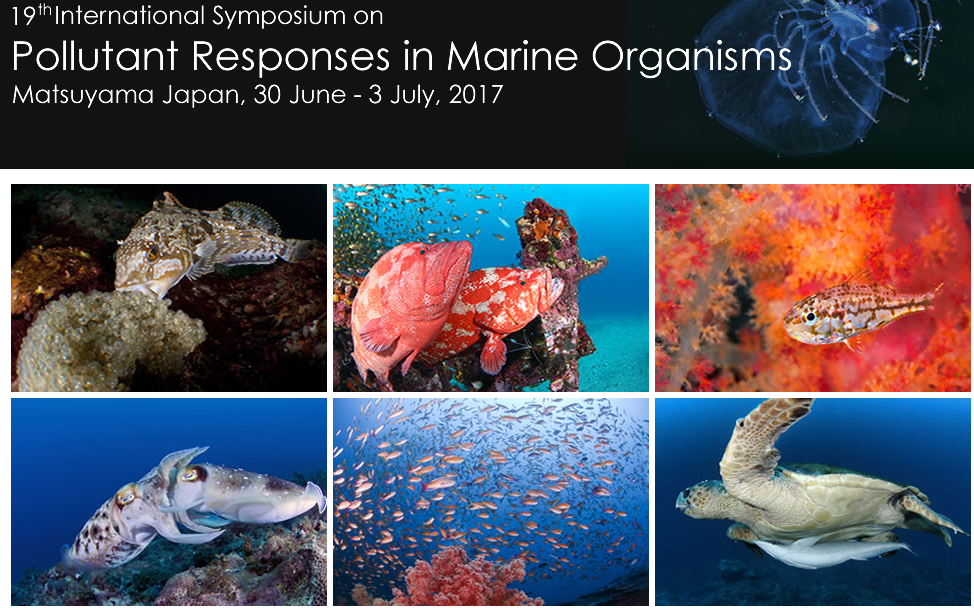
During the last PRIMO meeting “Pollutant Responses in Marine Organisms” in Japan, Lucia Pittura PhD Student at Polytechnic University of Marche, received the “Student Presentation Award” sponsored by Society for Environmental Toxicology & Chemistry (SETAC) for the oral presentation “PRESENCE AND ECOTOXICOLOGICAL RISKS OF MICROPLASTICS IN MEDITERRANEAN ORGANISMS”. Lucia presented data derived from the EPHEMARE Project.
- May 2017
IMPACT 2017 Winning Images
Congratulations to the winners of the EPHEMARE photo contest IMPACT 2017
First Place - Filipa Bessa - Zoo Plastics
Second Place - Catia Goncalves - The Dark Side of the Peacock
Third Place - Adam Porter - What a Fine Mess We Have Made
IMPACT 2017 vote for your favourite!
The entries are in for IMPACT 2017 and the judges have voted for their favourites! The public vote is now open! Go to our photo album IMPACT 2017 and like your favourite! If you are sharing an image please ensure you like the photo on the EPHEMARE Facebook page. The public vote will work on a points system as follows:
150+ likes = 5 points
71 – 90 likes = 4
51 – 70 likes = 3 points
21 – 50 likes = 2 points
0 – 20 likes = 1 point
The maximum points a photo can receive from the public vote is 5 points.
The vote will close on Monday June 12th at 11am (Irish time). The points from the public vote will be added to the judges points and the winners will then be announced!
- April 2017
EPHEMARE teams up with The Race for Water Odyssey
The Race for Water vessel, departed from Lorient, on April 9th, setting sail for a five-year mission to promote solutions for protecting the world’s oceans. Race for Water is a state-of-the-art vessel powered by a mixture of renewable energy sources: solar, hydrogen and a traction kite.
EPHEMARE will be joining the mission at two locations (Bermuda and Guadeloupe) this year. The Race for Water vessel will host EPHEMARE scientists from Vigo University, Bordeaux University, University of Antwerp and Marche Polytechnic University of Ancona. On these two missions, the researchers will be sampling microplastics in the water column, microplastics in emerged sediment, microplastics on beaches and collecting endemic marine organisms such as fish, crustaceans, molluscs and bivalves.
Another JPI Oceans project – WEATHER – MIC, will also be teaming up with Race for Water this year.
Stay tuned to our Facebook page and website for more updates and blogs from the EPHEMARE scientists on this exciting initiative!
Hans Peter Arp (Weathermic), Ricardo Beiras (Ephemare), Frederick Sciacca (Race for Water), Raimundo Blanco (Race for Water), Kim Van Arkel (Race for Water) visiting the solar boat in Lorient the day of before its departure.
EPHEMARE 2nd Annual Project Meeting
The 2nd Annual EPHEMARE project meeting was hosted by CNR – ISMAR in Genoa, Italy last week. The two-day meeting was in order to update consortium partners on activities to date and scheduled activities for 2017.
In 2016 EPHEMARE researchers were involved in numerous activities ranging from final selection of model target contaminants, to measuring the uptake, elimination and accumulation rates of small sized microplastics in Mediterranean mussels all the way to characterisation of different microplastics used within the EPHEMARE consortium under Environmental Scanning Electron Microscope (E-SEM). Pilot studies to determine best experimental set-up for uptake experiments and a microplastics counting method were established and the consortium undertook inter-laboratory comparison tests. A study of trophic transfer of microplastics into fish larvae commenced and preliminary tests with spiked plastics were undertaken to determine, if the ingestion of microplastics by marine zooplankton could increase the uptake of adsorbed non-polar organic toxins to plankton filter feeders. EPHEMARE researchers also evaluated the effects of microplastics on the immune systems of European sea bass, gilthead seabream specimens and a sea bass cell line and investigated the expression of genes related to oxidative stress, cellular stress and apoptosis in the seabream liver, head-kidney. The effects of microplastics on embryonic and larval development of mussels was studied as well as the exposure of mussels to virgin and spiked microplastics.
EPHEMARE researchers took part in a sampling campaign in the Belgium North Sea and fieldwork in the Adriatic Sea commenced to evaluate the presence, distribution and characterisation of microplastics in wild species of commercial interest along food webs. EPHEMARE launched the project website and a project Facebook page in 2016 and our researchers presented their work at many conferences such as SETAC in in France, MICRO in Spain, Plastics in European Freshwater Environments in Germany and the 30th ESCPB Congress in Spain. On top of publishing research in journals, EPHEMARE researchers took part in numerous events such as Polytalk 2016 in Brussels, the Teaching Laboratories in Ancona, the Italian festival of Science in Genoa and the Clean Coast Roadshows in Cork, Ireland.
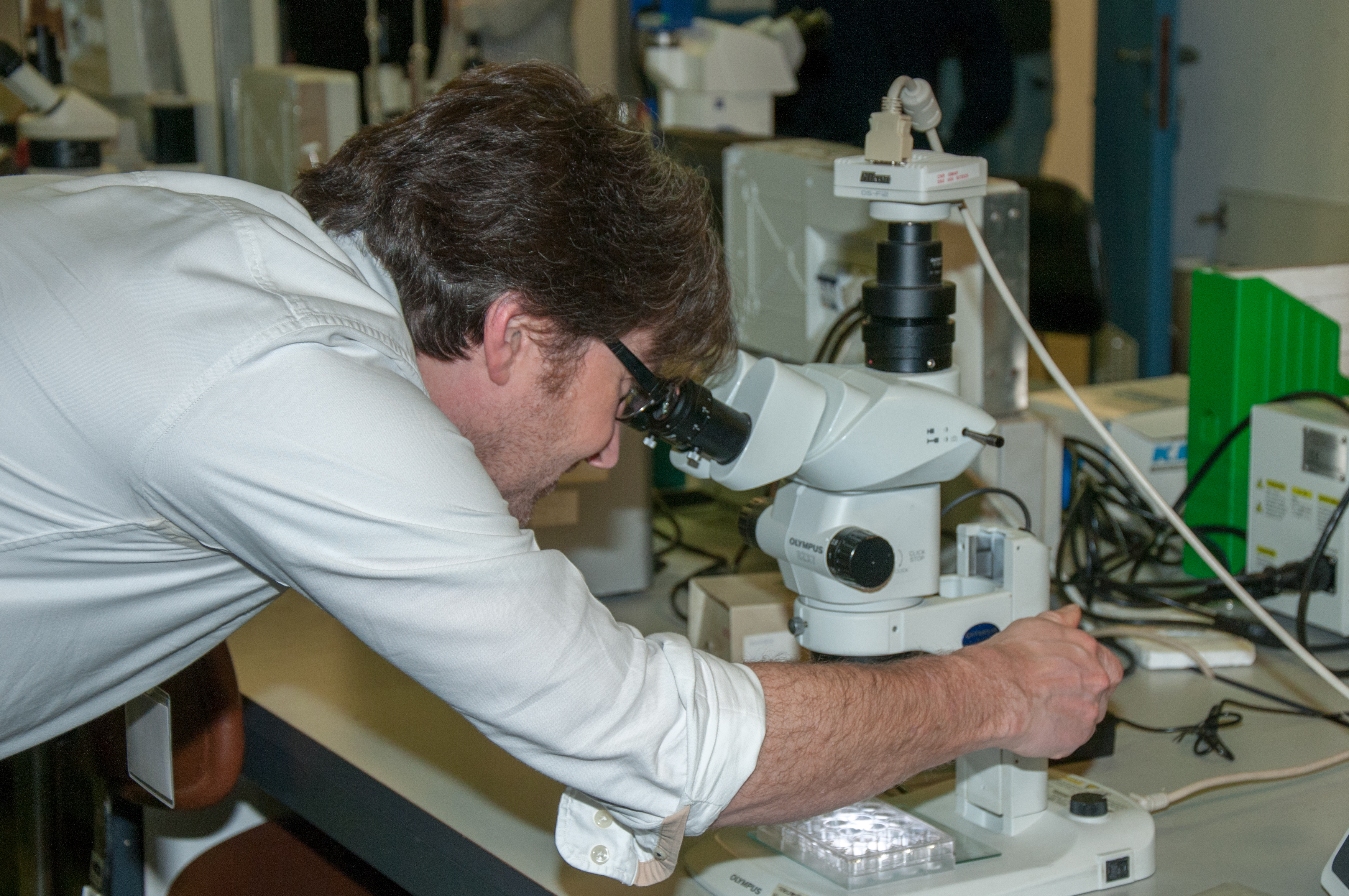
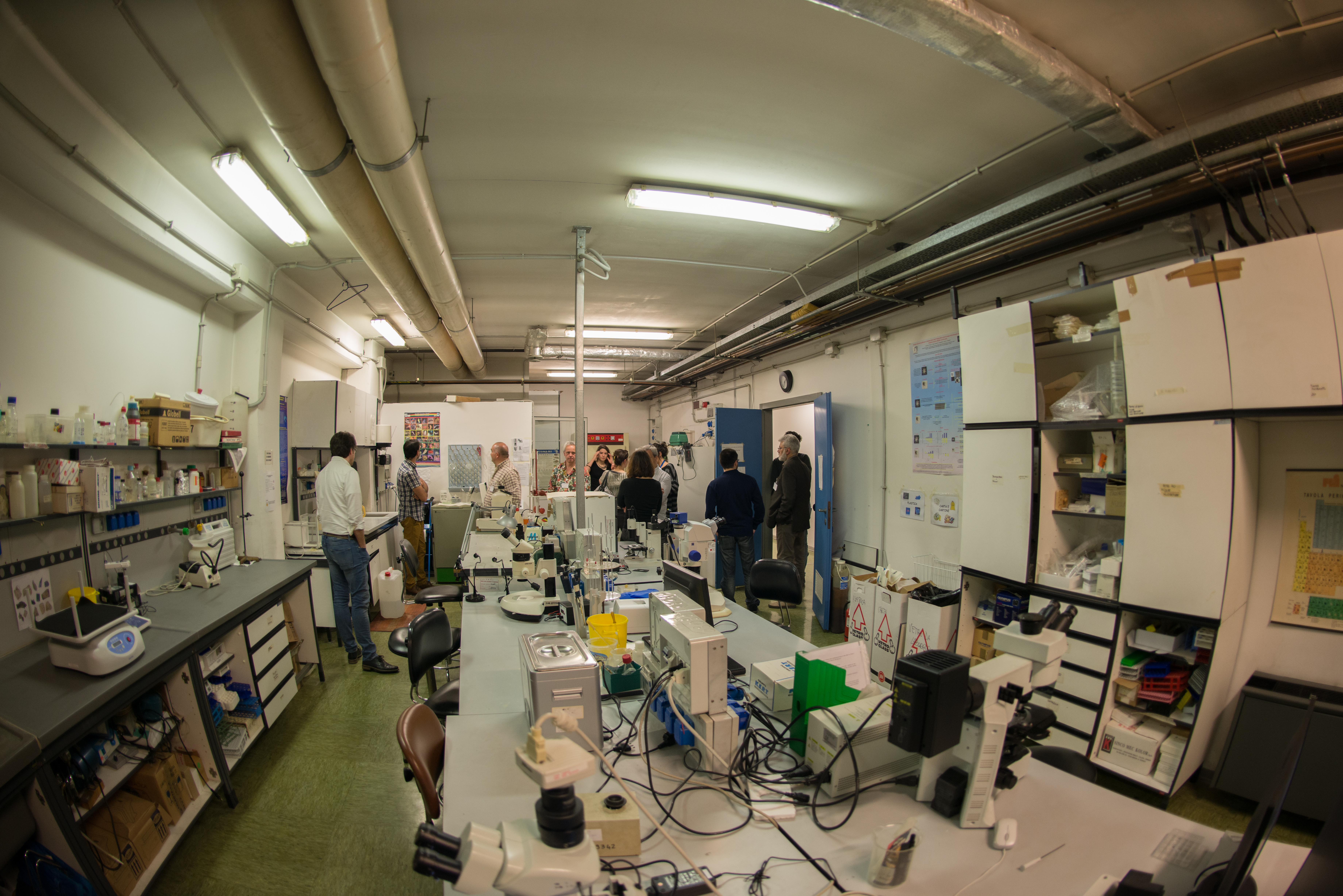
Activities for 2017 include:
- Completion of the extraction of absorbed compounds under simulated digestion conditions (using pepsin). The extract will then be chemically analysed and tested for endocrine disruption.
- Further microplastic uptake experiments, involving different organisms and types of microplastics will be conducted.
- An analysis of survival and growth disruption in species occupying different levels of trophic webs following exposure to microplastics and persistent pollutants will be conducted.
- An analysis of disruptions in early life stages in species occupying different levels of trophic webs following exposure to microplastics and persistent pollutants will also be conducted in 2017.
- Multiple experiments examining issues such as genotoxicity, endocrine disruption, gene expressions, proteomics and transcriptomics will be carried out in 2017.
- During 2017 partners involved in the extraction and characterisation of MPs in wild organisms will continue to sample and process organisms for microplastic extraction and characterisation. Experiments in controlled laboratory conditions will be performed to assess the uptake of microplastics by organisms, their compartmentalisation in tissues and the biological responses induced by microplastics and associated persistent pollutants.
Another exciting activity EPHEMARE are involved in for 2017 is the Race for Water Odyssey 2017 – 2021. Stay tuned to our website and social media sites for more information in the coming days!
- January 2017
Launch of IMPACT 2017 (International Microplastics Photo Contest)
The EPHEMARE team invites submissions to enter an International microplastics photo contest. IMPACT 2017 (International Microplastics Photo Contest) kicks off in May. Participants must register by April 28th. See below for more details!
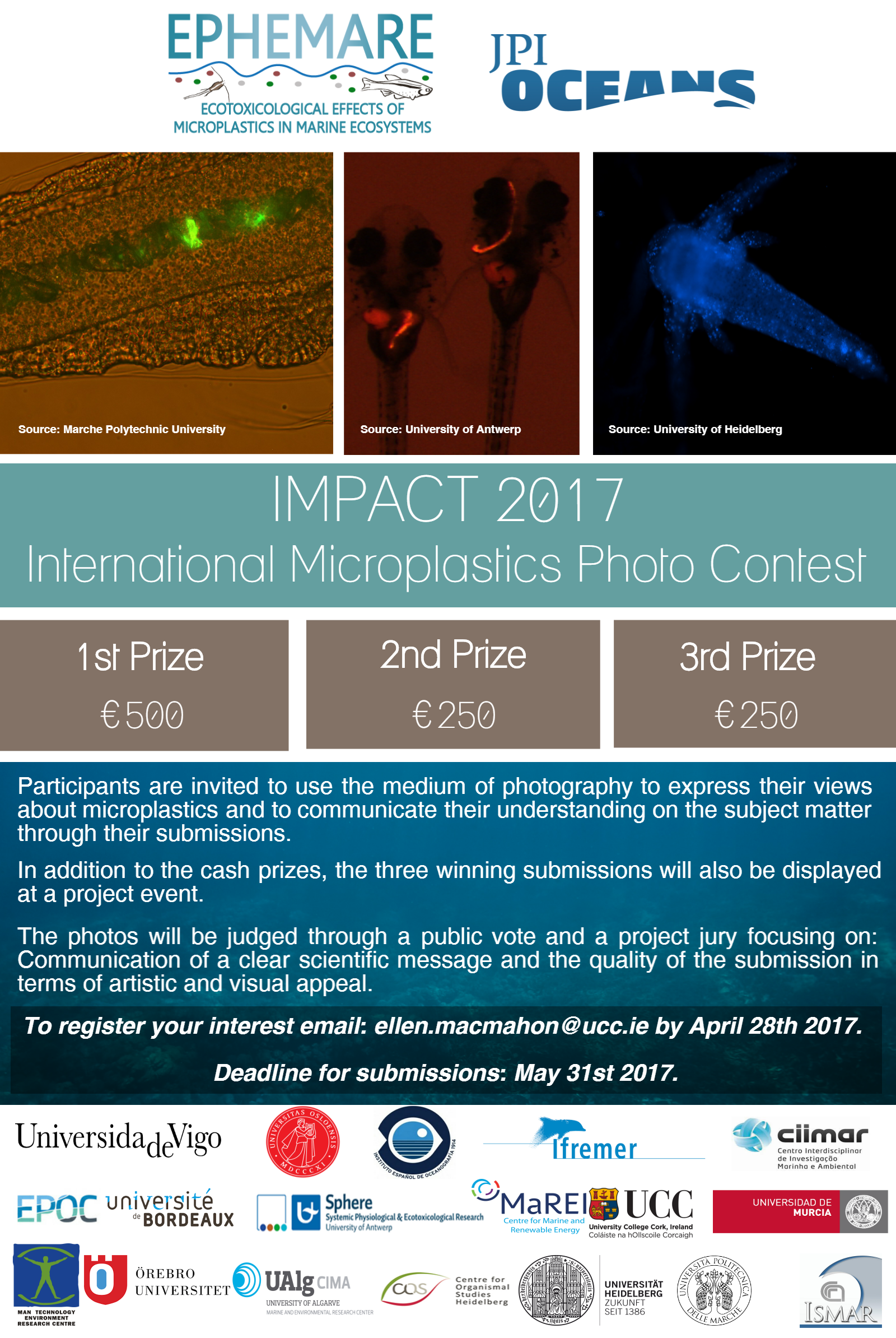
NEWS and EVENTS 2016:
- December 2016:
EPHEMARE E-Newsletter:
Click on the image below to access the first EPHEMARE E-Newsletter
Click here for a printable version of the newsletter.
Update from our Ecotox research group in Vigo on the exposure experiment of mussels to virgin and spiked microplastics, which took place in collaboration with the University of Antwerp and was coordinated by the Spanish Oceanographic Institute of Murcia. For more information follow the Vigo EPHEMARE blog here
EPHEMARE partners from University of Murcia, have published a chapter on "Microplastics in Aquatic Environments and Their Toxicological Implications for Fish" in the book "Toxicology - New Aspects to This Scientific Conundrum"
Click on the image below to access the chapter
- June 2016:
EPHEMARE was in attendance at the Plastics in European Freshwater Environments in Berlin, Germany. The conference ran from June 21st to 22nd.
- May 2016:
EPHEMARE Facebook Page:
New publication in Marine and Environmental Research
A new paper on 'Plastics and microplastics in the oceans: From emerging pollutants to emerged threat' by Carlo Giacomo Avio, Stefania Gorbi and Francesco Regoli (Marche Polytechnic University - EPHEMARE) has been published in the Marine and Environmental Rsearch Journal. To access the paper click on the image below.
-MICRO 2016 - Lanzarote, Spain 25-27 May. EPHEMARE gave two presentations at this years MICRO conference in Lanzarote. Francesco Regoli, Stefania Gorbi and Carlo Giacomo Avio from Marche Polytechnic gave a presentation to delegates on the Extraction and Charecterization of Microplastics in Marine Organisms Sampled at Giglio Island after the Removal of the Costa Concordia Wreck
Stefania Gorbi, Francesco Regoli and Carlo Giacomo Avio also gave two poster presentations on 'Presence, distribution and charecterization of microplastics in commercial organisms from the Adriatic Sea' and 'Toxiological effects of Microplastics in Marine Environment - EPHEMARE'.
Click on the images above to access the poster and presentation.
A brief summary on the International MICRO Conference can also be found by clicking on the image below.
-SETAC Europe - Nantes, France 23-26 May. EPHEMARE gave two presentations at this years SETAC Europe conference. Annika Batel and Thomas Braunbeck from the University of Heidelberg presented a poster on their study of Alternative Pathways of Microplastic Exposure - Microplastics and Associated POPs on Zebrafish Gills (Danio Rerio) and Zebrafish Eggs
Annika Batel also gave a presentation on the Trophic Transfer of Microplastics and Associated POPs
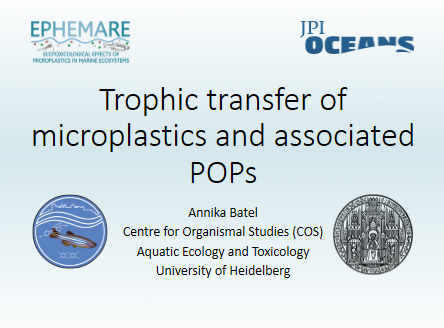
Click on the images above to access the poster and presentation.
-EPHEMARE at the Teaching Laboratories 19-22 May, Ancona, Italy
The laboratory of Ecotoxicoly of UPM participated at the event “TIPICITA’ IN BLU”, which was held in Ancona (19-22 may 2016), to rise public awareness on important sea issues, including Blue economy and Blue growth, seafood safety, protection of the marine environment.
During these days, several teaching laboratories were organized for students aged from 8 to 18 years, in order to disseminate information on the Adriatic Sea environment (ADRIATICOLAB). In this context, our Lab (UPM) presented a lab activity titled: A “SEA” OF PLASTIC (un “mare” di palstica - in Italian). Several games and practical experiences related to the presence of plastic and microplastics in the sea were proposed; moreover through the use of microscopes, children and parents had the possibility to observe the microplastics in personal care products (exfoliants, nail varnishes, etc.) and small fragments of plastic found some in marine organisms sampled in the Adriatic sea .
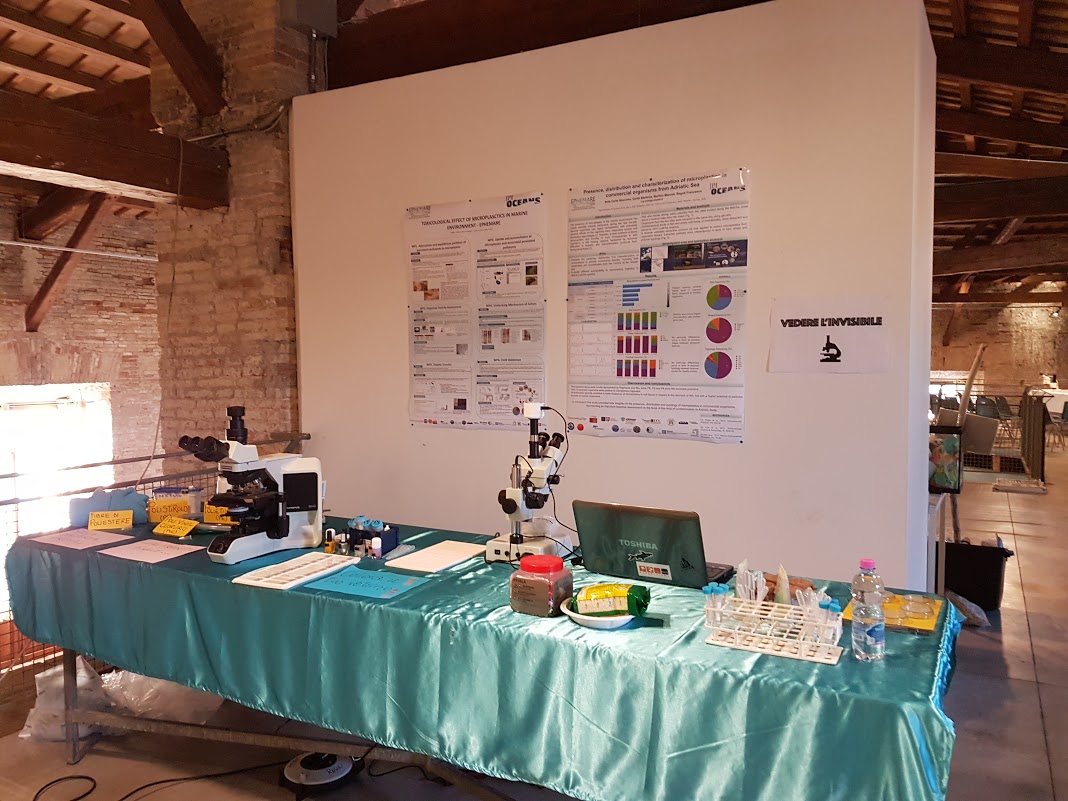
- The ECOTOX Research Group from the University of Vigo is looking for a postdoctoral researcher for EPHEMARE Project interested in applying for a Marie Sklodowska Curie Individual Fellowship 2016. For more information on our host offer for the research project please visit the following link: http://www.eshorizonte2020.es/expressions-of-interests/ricardo-beiras
- March 2016:
-EPHEMARE was represented at the Polytalk 2016 - http://www.polytalk.eu/ by our project partners from the SPHERE group of the University of Antwerp (Belgium). Polytalk is a European Plastics Industry Summit and organised by the plastics industry for all key players: industries using plastics, retailers, policy-makers, NGOs, media and academia. PolyTalk 2016 took place in Brussels and focused specifically on Marine Litter, a key issue for the image of plastics and corresponding business, which is global and very complex, involving a multitude of actors.
- February 2016:
-The EPHEMARE WP leaders traveled to Madrid for the 17th of February 2016 to take part in the Ecological Aspects of Microplastics Projects Kick-off Meeting http://www.jpi-oceans.eu/news-events/events/jpi-oceans-%E2%80%9Cecological-aspects-microplastics%E2%80%9D-projects-kick-meeting. This meeting provided an opportunity for the WP leads of all four approved projects, following the 2014 JPI Oceans Pilot Call on ecological effects of microplastics, to introduce themselves, discuss cooperation and coordination and align related activities.
- January 2016:
-The EPHEMARE project Kick off meeting took place in San Pedro, Mucia, Spain on the 19th and 20th of January, 2016. The meeting brought experts from Spain, France, Italy, Portugal, Germany, Belgium, Sweden, Norway, Ireland and the UK together and allowed face to face meeting with project partners facilitating great discussions about the EPHEMARE investigation into the toxic effects of microplastics on marine organisms.
